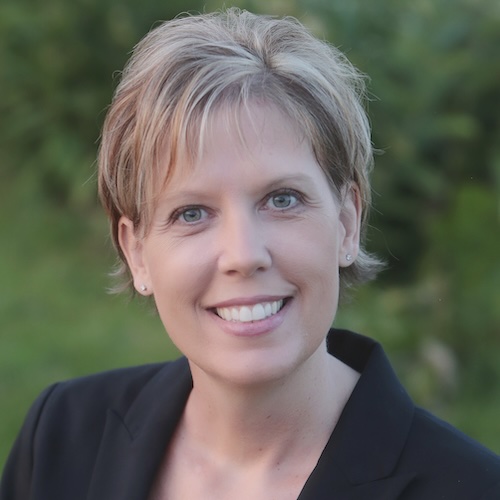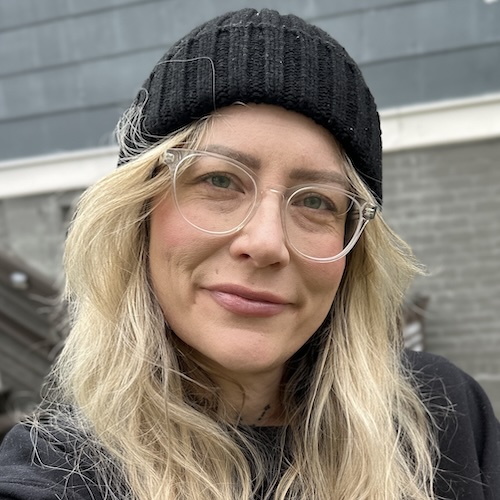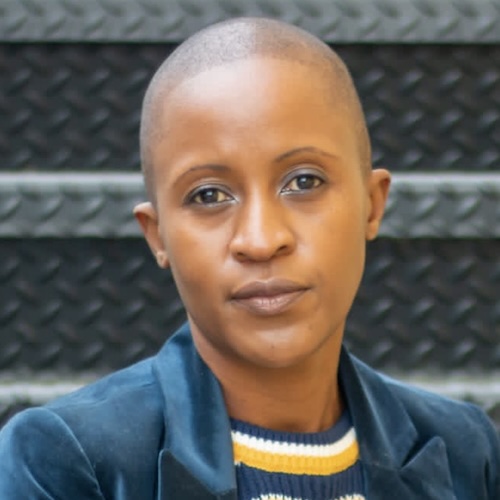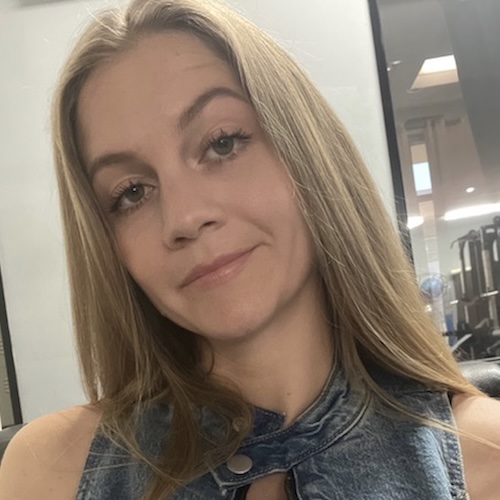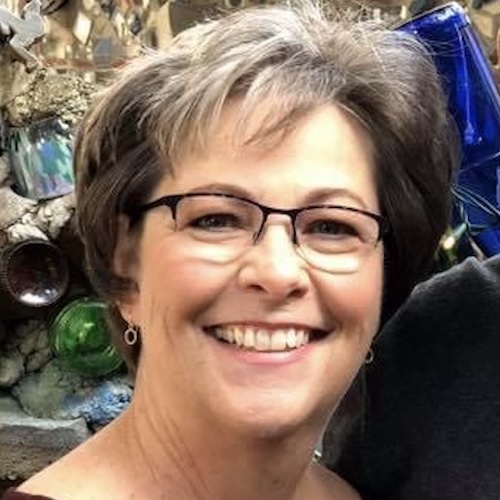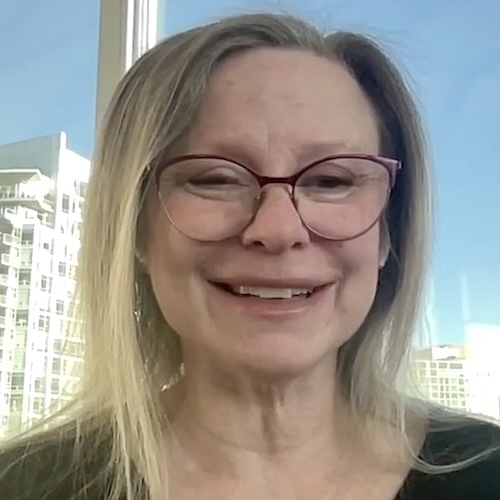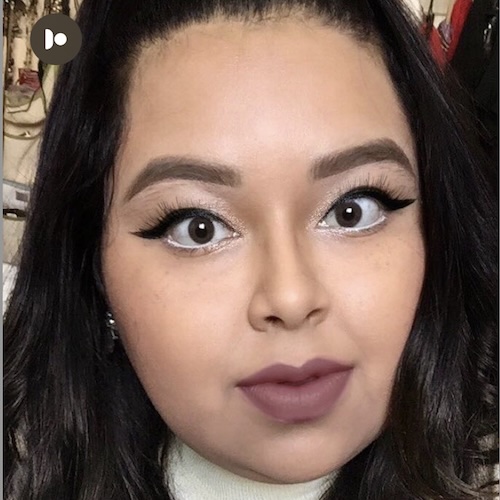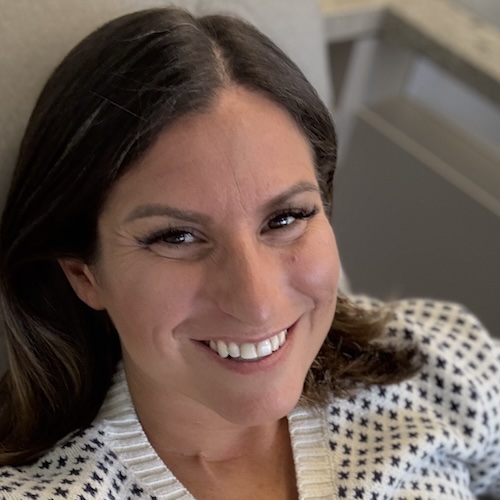Renée’s Stage 2 Breast Cancer Story
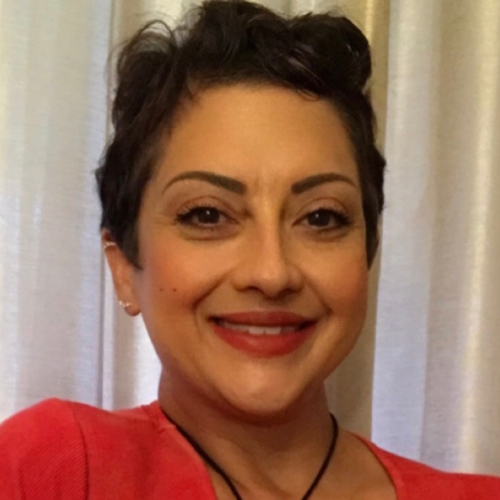
Renée first met cancer at 18 when she was diagnosed with acute myeloid leukemia.
In 2019, she was diagnosed with stage 2 breast cancer, which metastasized to her lymph nodes.
In this story, she shares how she developed a second cancer, the challenges she underwent with her treatment plan and how she continues to “thrive” as a survivor.
This interview has been edited for clarity. This is not medical advice. Please consult with your healthcare provider for treatment decisions.
- Name: Renée F.
- Diagnosis:
- Breast Cancer
- Staging: 2
- Initial Symptoms:
- Breast shaped differently
- Dimple in breast
- Flat nipple
- Treatment:
- Maintenance Treatment:
Whatever stage you are in and whatever year in your journey you are in, may I remind you: you’re still here. You are still thriving. Even if it was a hard day yesterday, you’re here and that is to be celebrated and enjoyed.
- Life after leukemia
- When did you start to notice something?
- Cancer genetic testing as a bone marrow transplant recipient
- Treatment
- What was the treatment plan?
- How did you process this diagnosis compared to your first?
- Breaking the news to my daughter
- Side effects from treatment
- What did you learn from going through leukemia that helped you?
- What helped you process your breast cancer diagnosis?
- What happened after you got a unilateral mastectomy?
- How do you feel knowing that everything is good and stable?
- Words of advice
It really took hearing my daughter say, ‘My mommy is a cancer survivor,’ to understand that when we say it, it’s power. We’re getting our power back by saying, ‘I have cancer.’
Life after leukemia
I’m a single mom. I’ve been on my own since she was born and it’s been really tough. But at the same time, I have her looking up at me. It’s like, “How do I explain to my five-year-old (at the time) that I have cancer? How do I reassure her and myself that things are going to be okay?”
I remember being afraid to say the word cancer because it’ll make it real. Then I realized I need to call it by its name because it needs to know my name. If I give it space, then I have some ownership over that, have some control, and it eliminates the scary a little bit.
It really took hearing my daughter say, “My mommy is a cancer survivor,” to understand that when we say it, it’s power. We’re getting our power back by saying, “I have cancer,” and so is saying, “I’m sick.”
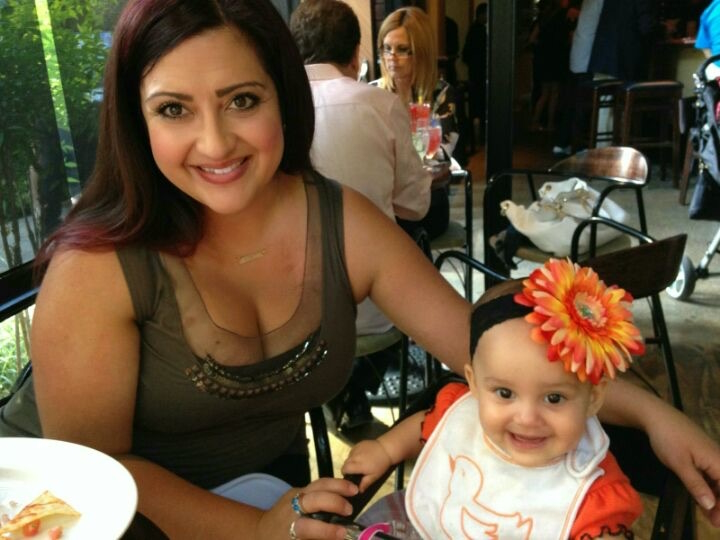
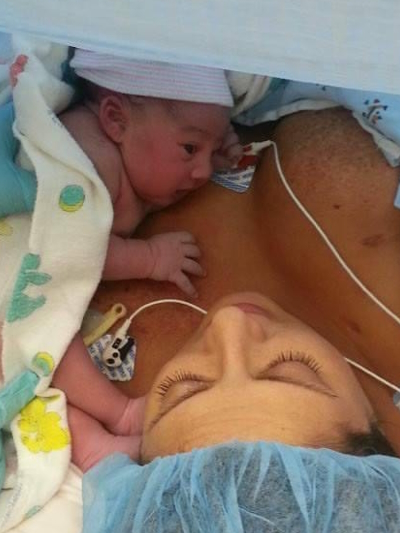
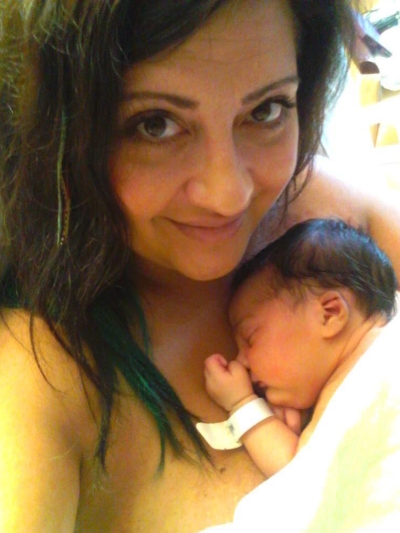
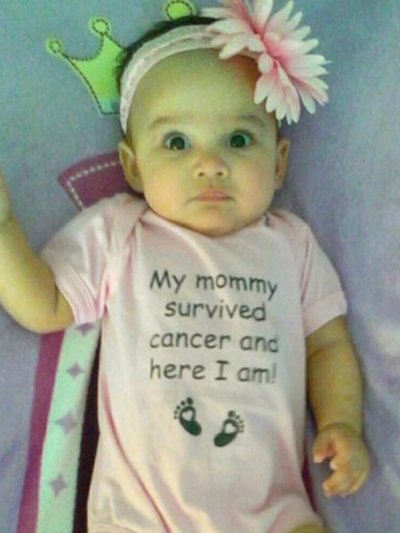
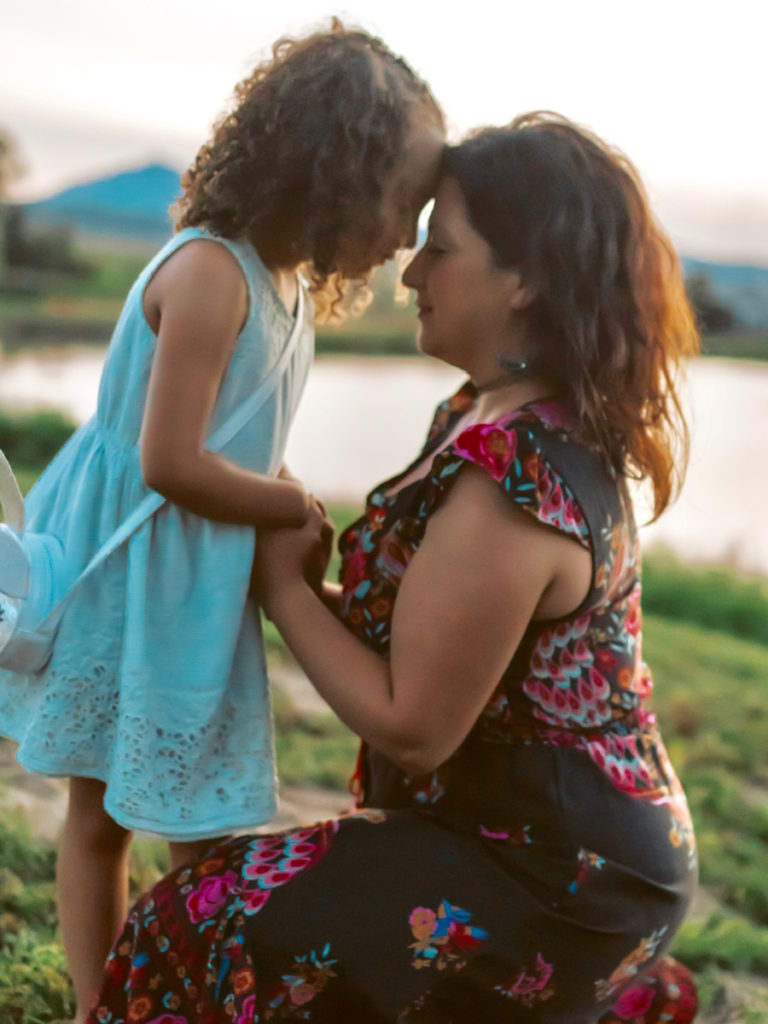
To miraculously get pregnant just blasted all of my doctors’ minds because they’ve always said this is medically impossible. It’s clinically impossible. Total body radiation for two months. There was no fertility at all.
It’s even more incredible because I had my bone marrow transplant [on] September 17, 2002. Eleven years later, I miraculously got pregnant. My due date for my daughter was September 17, 2013. She arrived early [though].
When did you start to notice something?
When I got diagnosed with breast cancer, it was like a sucker punch, but at the same time, I kind of knew what to do this time.
For the last 20 years, we’ve been monitoring my blood work, focusing on my immune system, my anemia, and kind of touch and go on other things. There’s been lumps and bumps throughout the years, but everything has been biopsied and perfectly fine.
I was doing a regular monthly check and didn’t feel anything different or strange. I was about to get in the shower but I dropped something. When I went to pick it up, I saw my reflection in the mirror and noticed that one of my boobs was shaped [differently] when I leaned over. I thought, That’s strange.
I grabbed another mirror and did a couple of little movements then realized if I put my arm up, this whole breast was a totally different shape. I thought, That’s different, so I noted it.
The following day, [as] I’m getting dressed, I notice there’s a weird dimple in my boob that wasn’t there before. Maybe I gained weight. I weighed myself. A couple of days go by and now [I] notice my nipple is flat but I don’t feel anything. It just looks different on the outside.
I had a routine follow-up appointment with my doctor, the one who told me I was pregnant, and [as] we’re finishing things up, she tells me, “Is there anything else before we leave today?” I walk out and said, “Oh, I forgot to tell you! My boob looks kind of weird.” She goes, “What?” She took a look at it and immediately sent me over to get a mammogram.
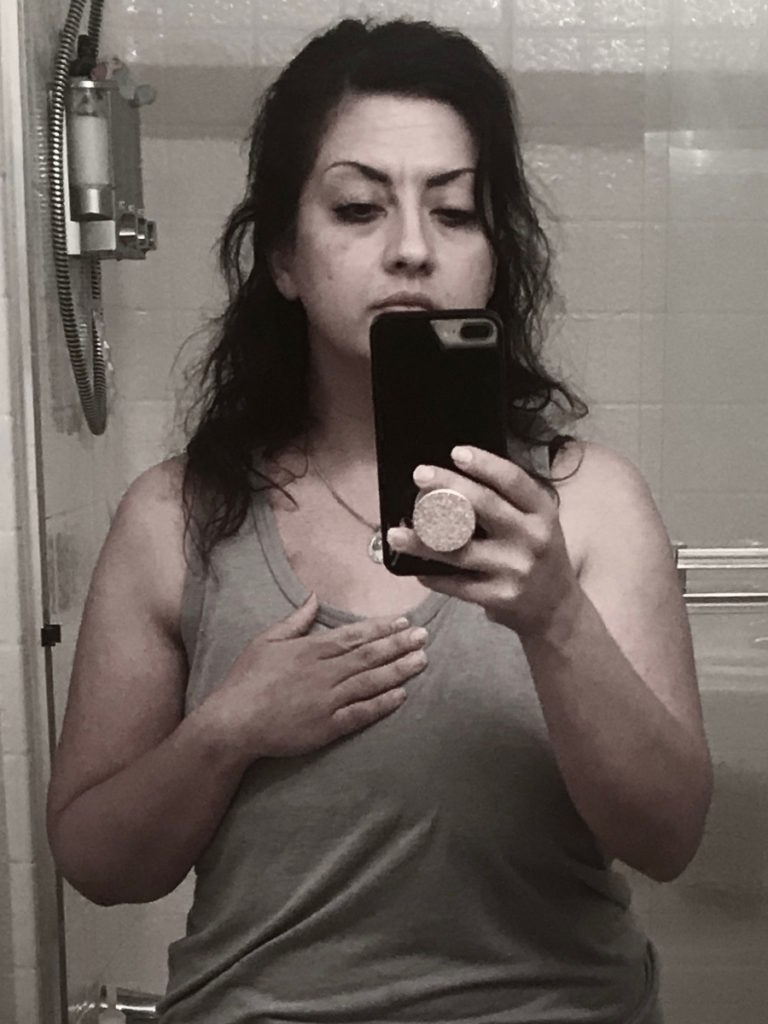
When we got to the appointment and my doctor walked in, she didn’t have to say anything. She just started crying.
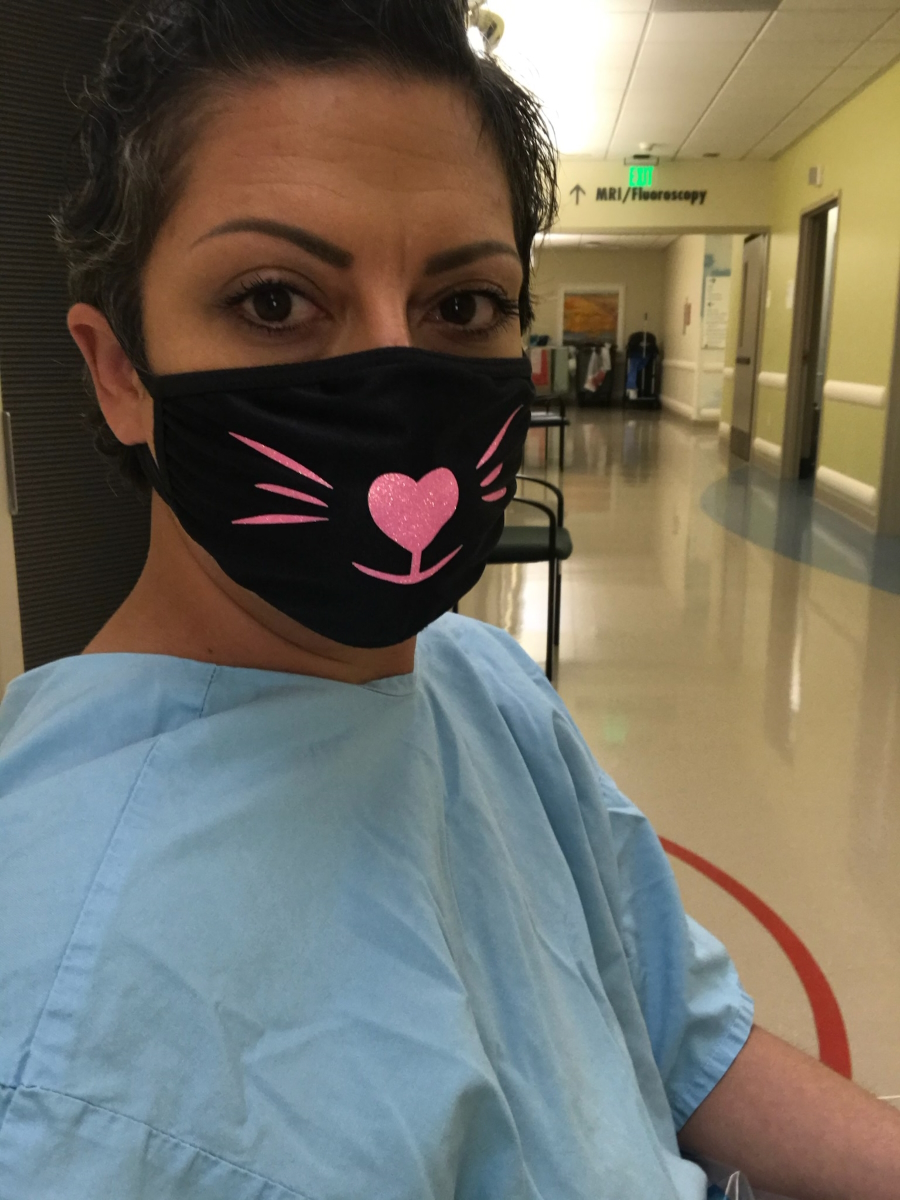
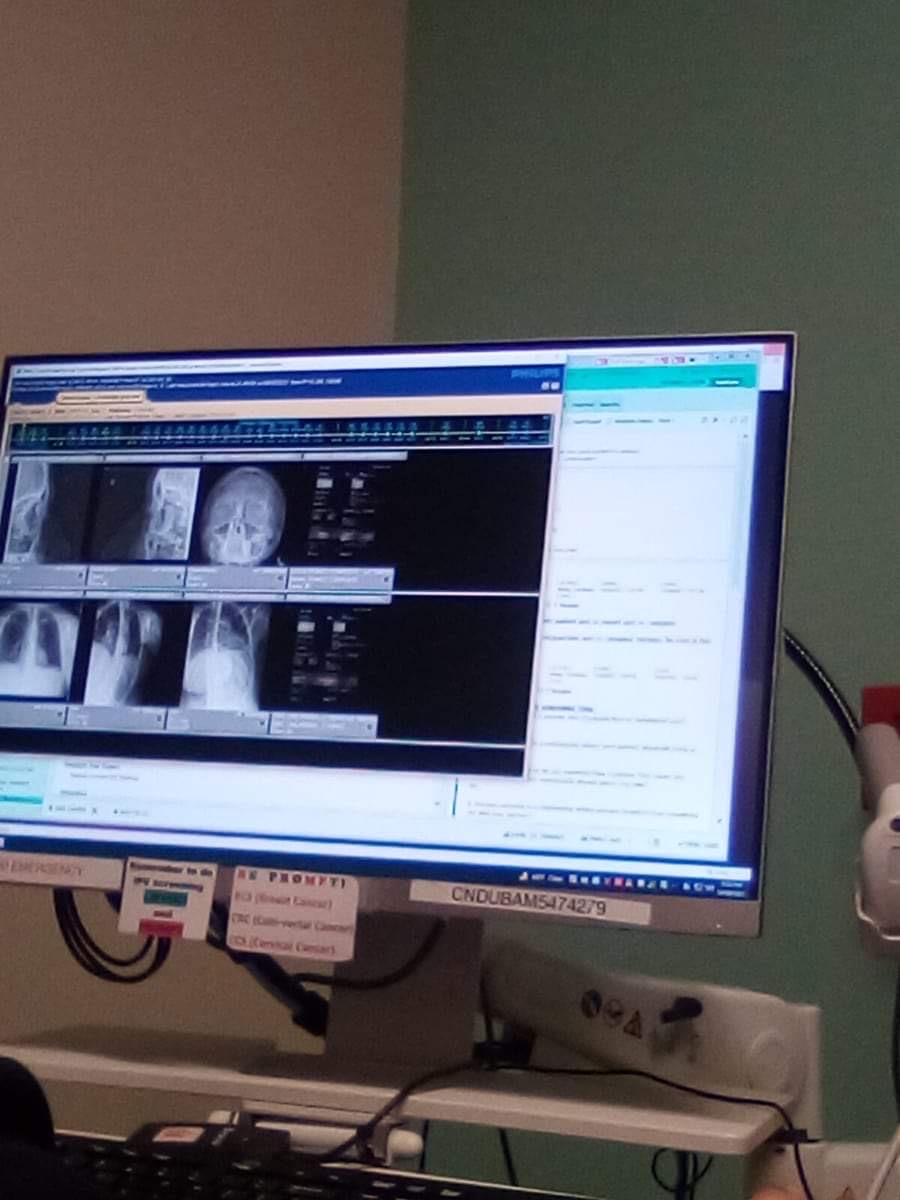
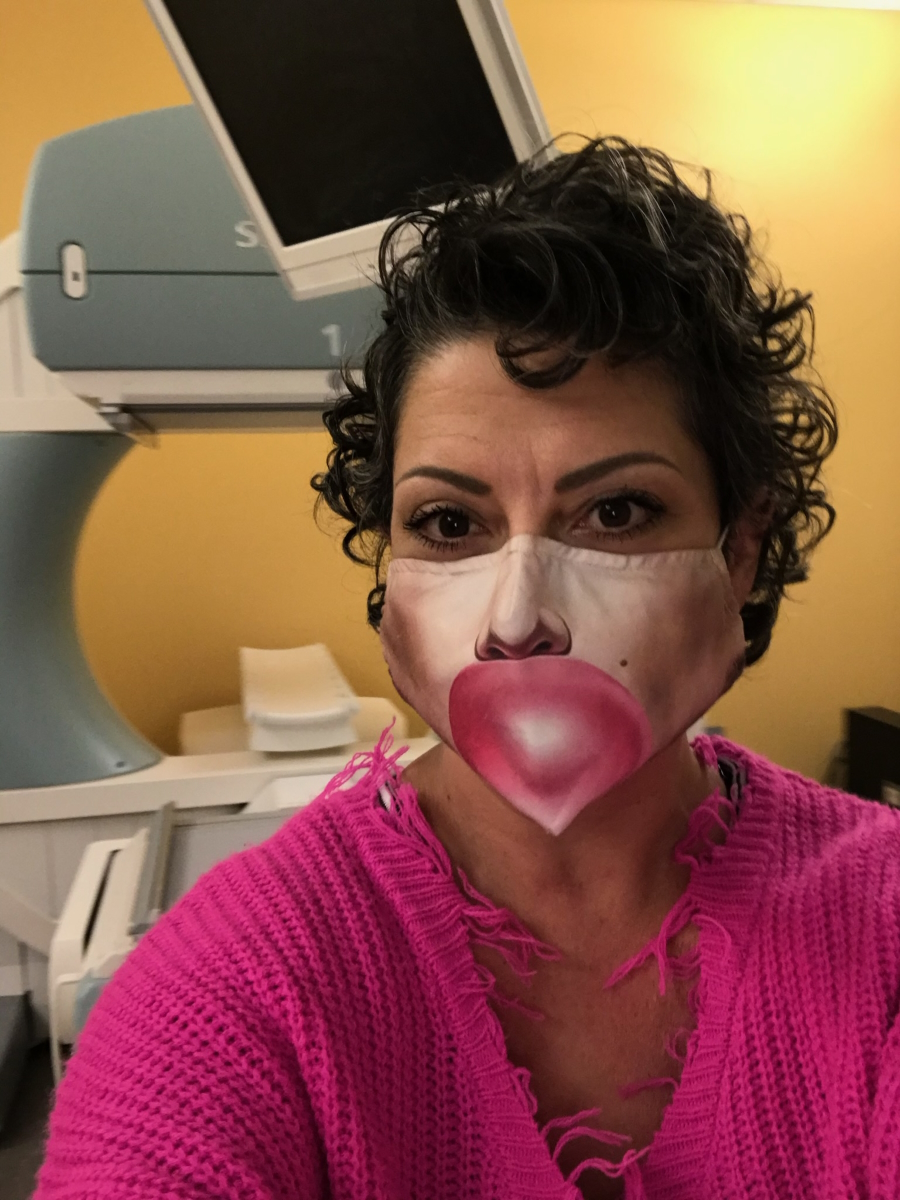
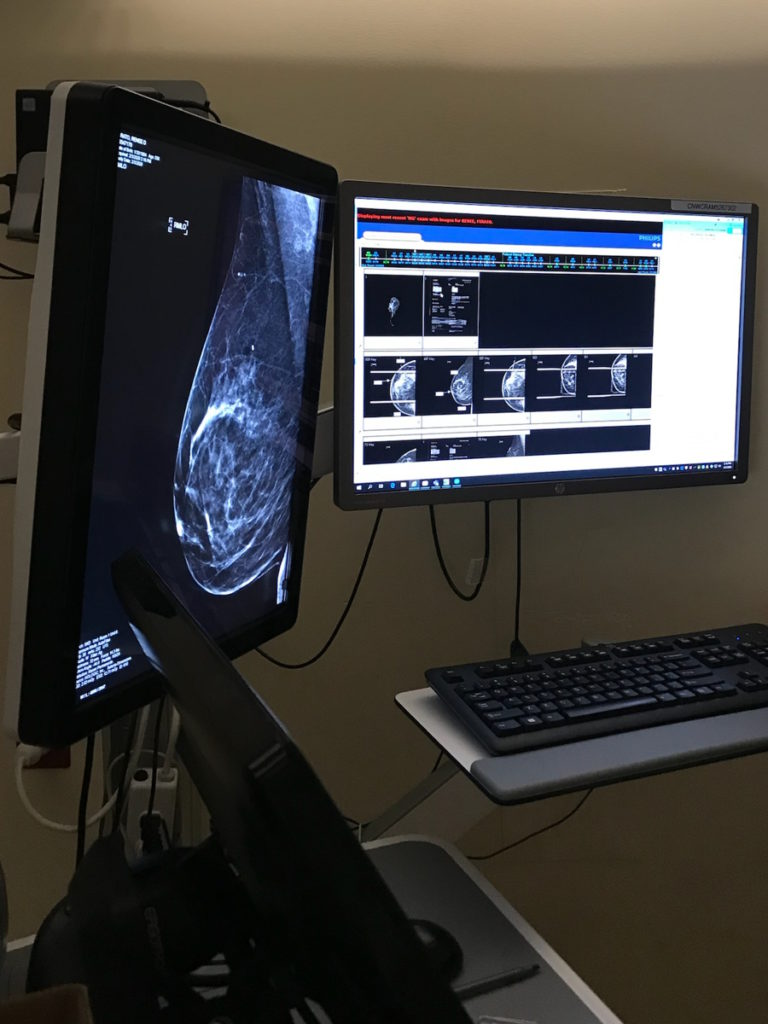
In the middle of getting the mammogram, the nurse left the room, came back, and said, “All right, you need to get dressed. We need to go to a different room because we need to do a biopsy.” I was like, “What? Right now?” She’s like, “Yeah, right now.”
She took me to another room, set me up for a biopsy, did this whole biopsy, called the doctor, and then told me, “I’m going to leave you here because I need to go take your results to the lab. Your doctor wants it stat.”
I’m laying with my arm up on this table for what feels like forever. She comes back, does two more biopsies, marks me up, and then says, “You have an appointment tomorrow with your doctor. You should bring somebody with you.”
My mom came with me. When we got to the appointment and my doctor walked in, she didn’t have to say anything. She just started crying. I was crying and said, “What is it?” She goes, “It’s metastatic breast cancer. It’s stage 2.” I said, “How come I didn’t feel anything?” And she says, “It’s behind the breast tissue. It’s along your rib cage and it goes all the way to the back.”
It was a whirlwind [of] scheduling and trying to figure out what we do now.
Cancer genetic testing as a bone marrow transplant recipient
I had to contact all of my bone marrow transplant doctors and let them know what was going on because it meant that we had to do completely different genetic testing. I’ve had a bone marrow transplant so it was a whole different ball game for me.
When you have a bone marrow transplant, it wipes out your immune system [and] also your blood system. When you have an organ transplant, you have a donor organ being transplanted into your body. Bone marrow is an organ so even though I’m me on the outside, technically, I am my sister.
Because of genetic testing, we’re able to determine whether or not this is a line that carries in our family history and if we need to be concerned for other members [of] the family. When you have somebody else’s bone marrow, I’m technically her makeup even though I have my own genetic makeup.
It sent the scientists on a whirlwind trying to figure out what tests to do on somebody like me where if we do a blood test, it’ll show my sister and what her predisposition conditions could possibly be, not mine.
Luckily, we were able to determine that this breast cancer was not genetically inherited. It was in direct relation to, most likely, the chemical burns, doxorubicin, and total body radiation, which is weirdly comforting in the sense that at least I know it’s not genetic.
It’s a little frustrating to know that this is from what I had to have. If I would have known then what I know now, would I change anything? No, not at all. If I would have known then that I would end up at 35 years old with stage 2 breast cancer, I still would do everything the same.
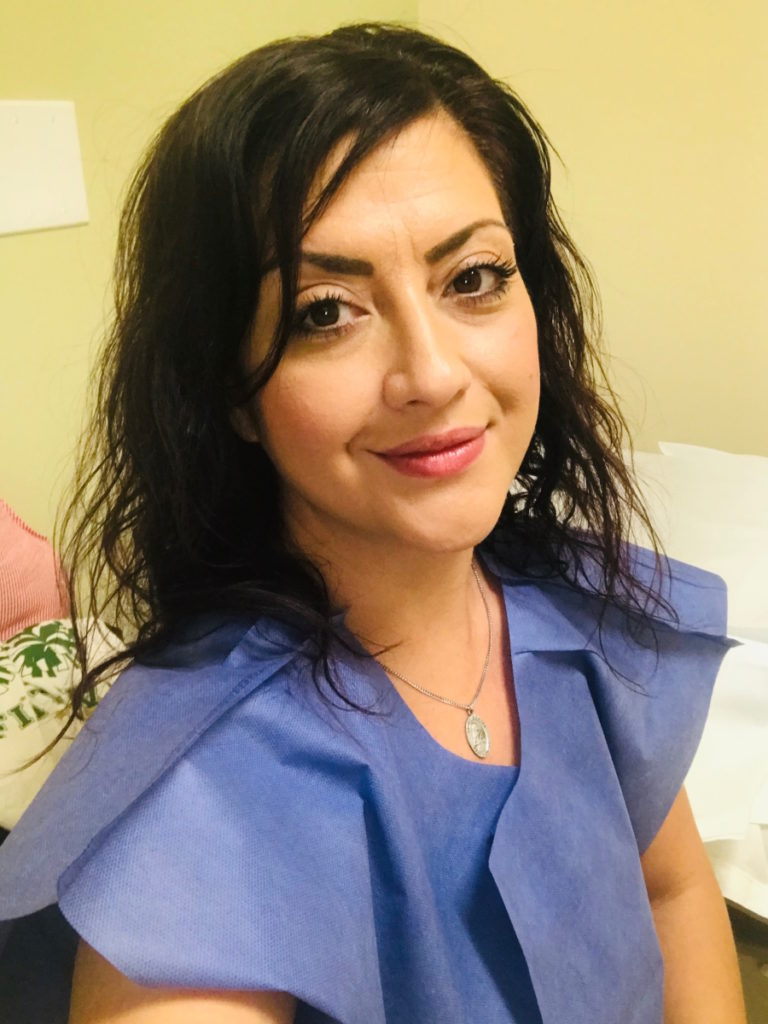
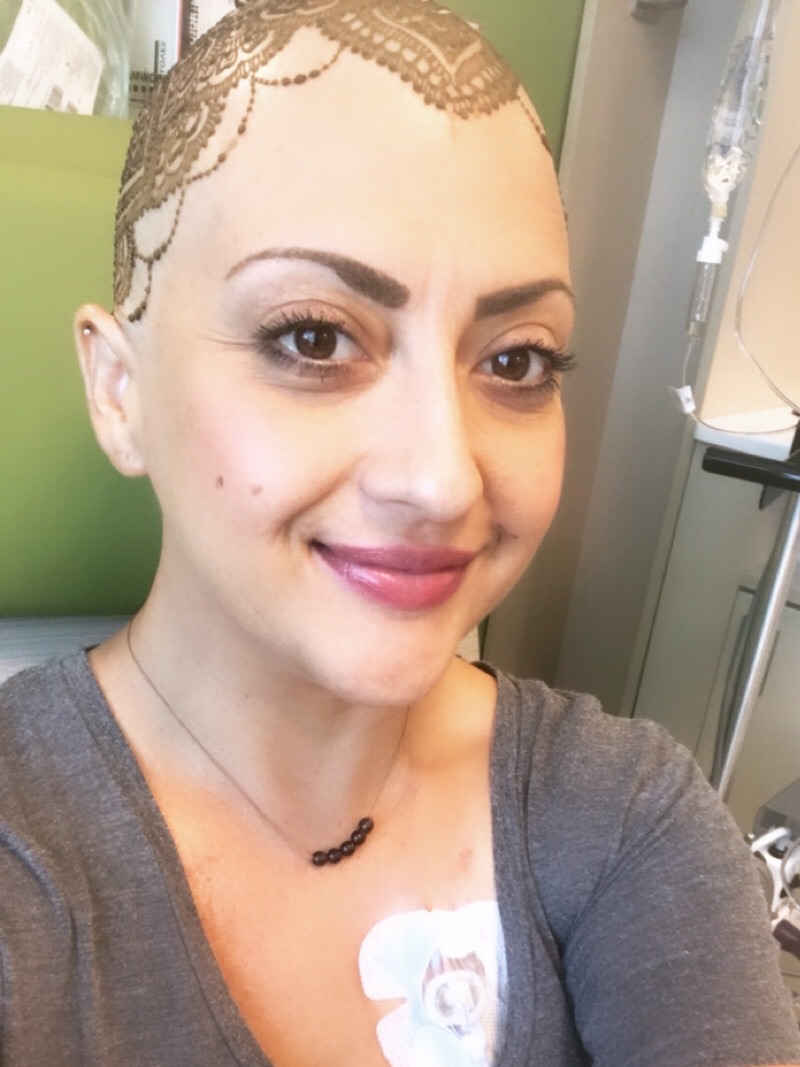
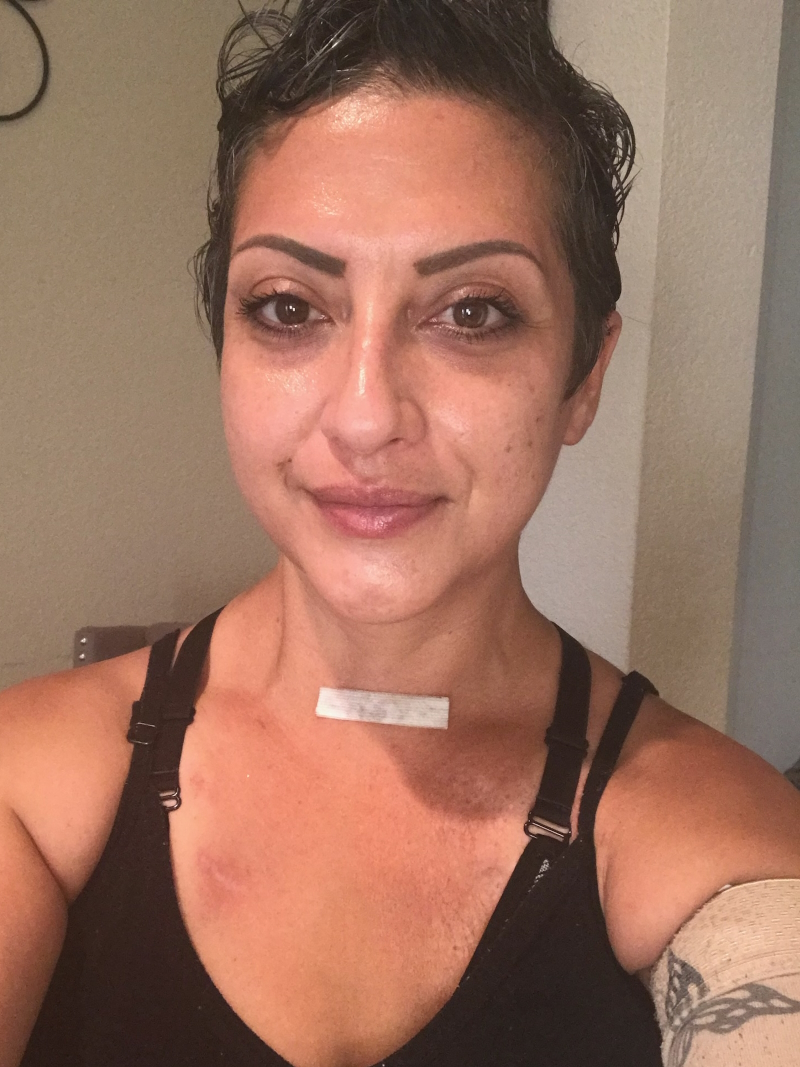
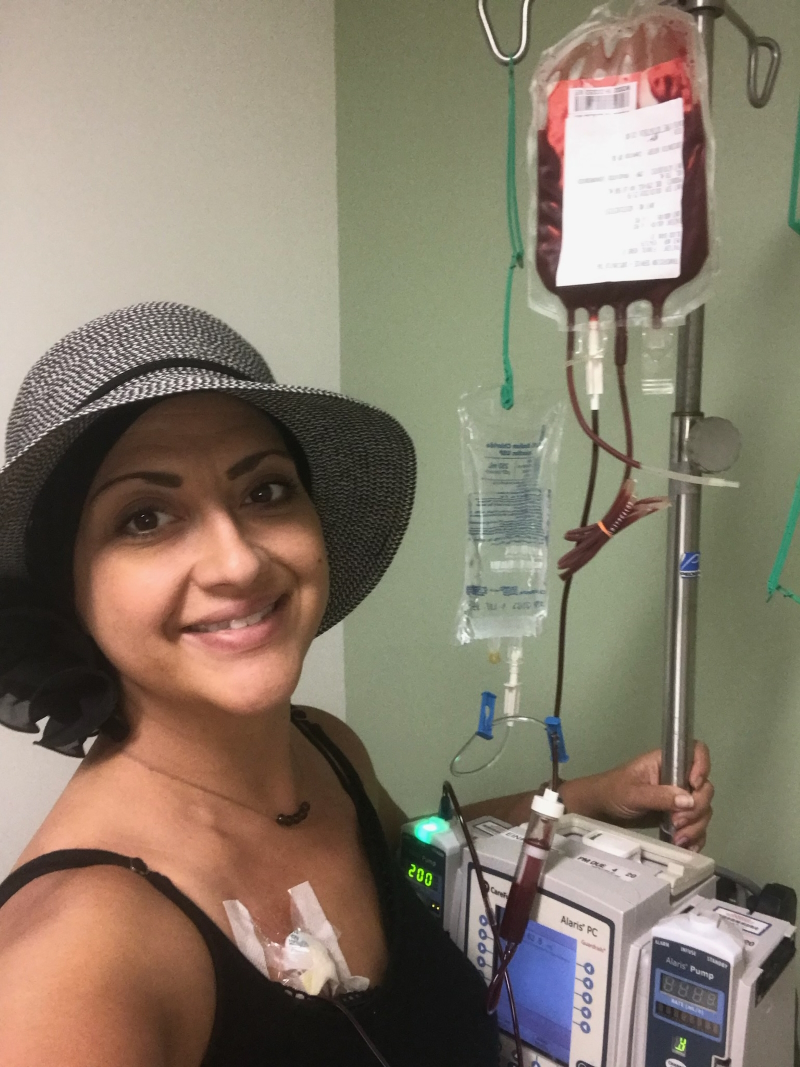
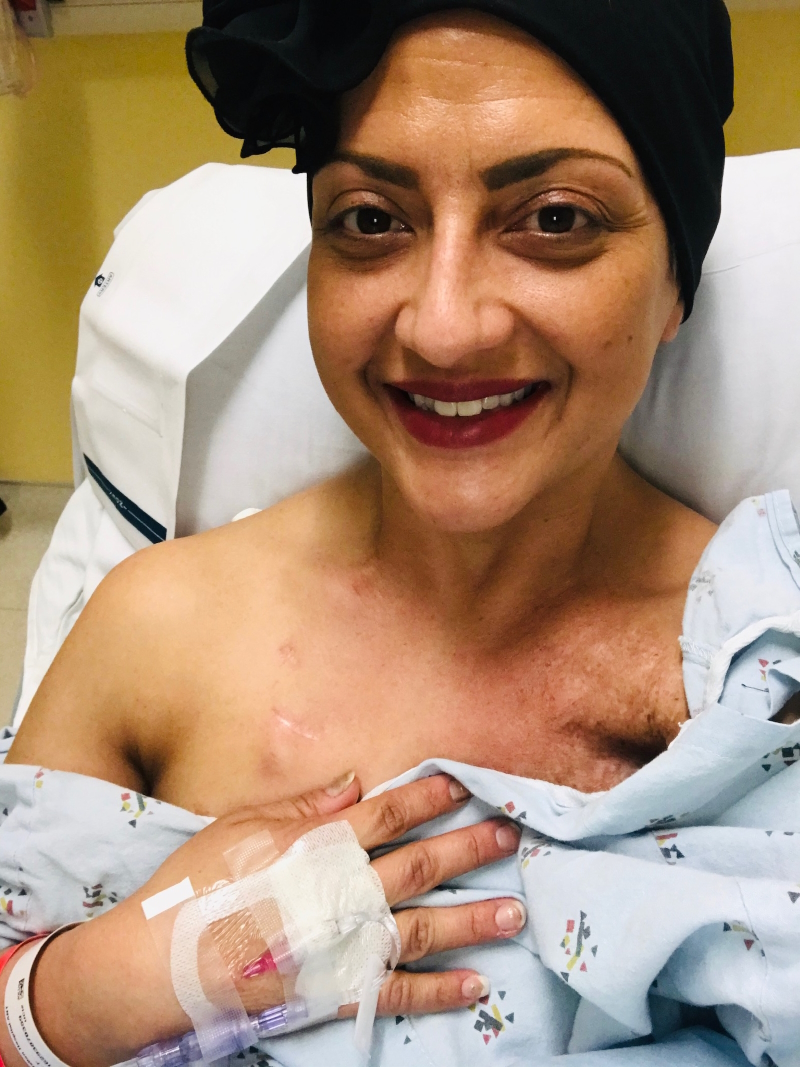
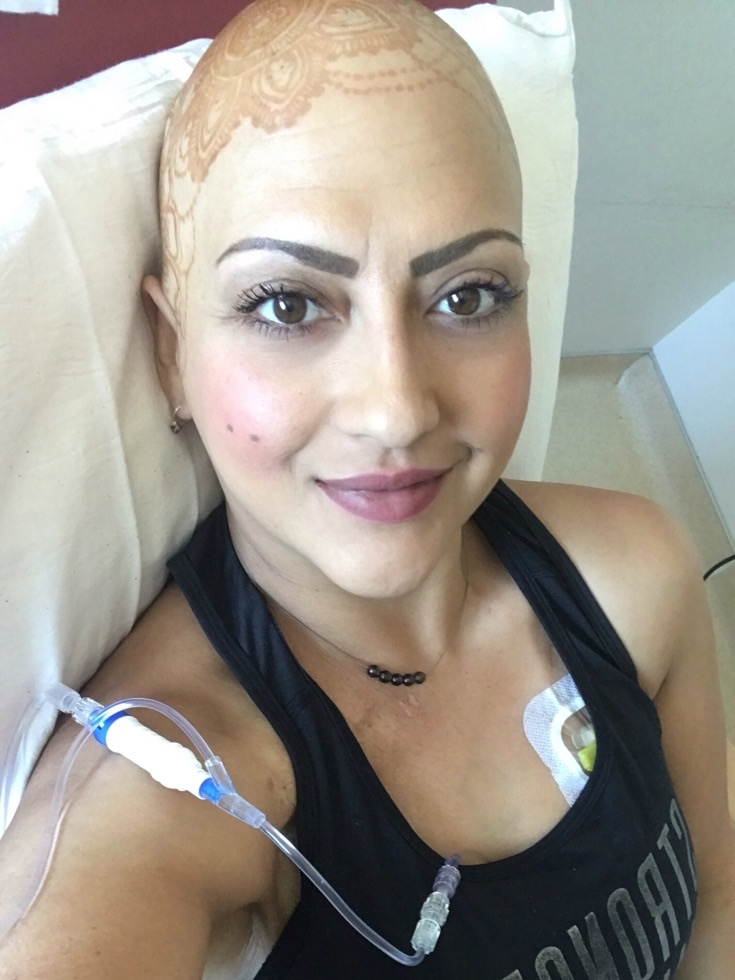
Treatment
What was the treatment plan?
The plan was to go with chemotherapy and radiation to wipe out the immune system and bone marrow to do a full bone marrow transplant and cross our fingers. The long-term routine was to continually check the blood levels and make sure that everybody is where they’re supposed to be.
Then just managing the chronic issues from the treatments — fibromyalgia, migraines, and things like that — and regular cancer awareness routines, self-checks, and making sure to get my first mammogram at 40, and just stick to that.
When I got diagnosed with breast cancer, it changed everything because I had so much chemotherapy given to me in 2002. There’s only so much your body can have maximum. I’m on eight doses out of ten.
What was really frustrating was that once we found out that it was metastatic breast cancer, I already had a lot of the typical chemotherapy that’s used to treat this type of cancer.
It would be in my best interest to do a different chemotherapy routine, hope that that works, and shelf the remaining doses of doxorubicin, just in case, and just try our luck.
If I would have known then that I would end up at 35 years old with stage 2 breast cancer, I still would do everything the same.
How did you process this diagnosis compared to your first?
I think I processed this one better because I was awake. When I was going through leukemia, I was so sick, medicated, and comatose so I really don’t remember a lot.
I’m thankful because we kept daily logs of what was going on and I can look back. Thank goodness I don’t remember because I don’t want to.
Walking into treatment brought back flashbacks that I was not expecting to have and moments that I was not prepared to cope with. I think it made it hard for my family to embrace the situation because I did keep a lot of things internally.
You have these emotional breaks where you’re just a wreck and people don’t know how to cope with that. They don’t know how to comfort somebody. “Oh, you’re going to get better. You’re going to be fine.” Not really helping.
Tell me I can be angry. Tell me it’s okay to be upset. Then tell me I’m strong. I got through yesterday. Remind me of another time when it was really tough and I got through that. Because no matter how hard this might be, even if I’m on the floor in the fetal position, feeling desperate and clinging to life, I’m still clinging to life and that is to be celebrated, that is to be focused on.
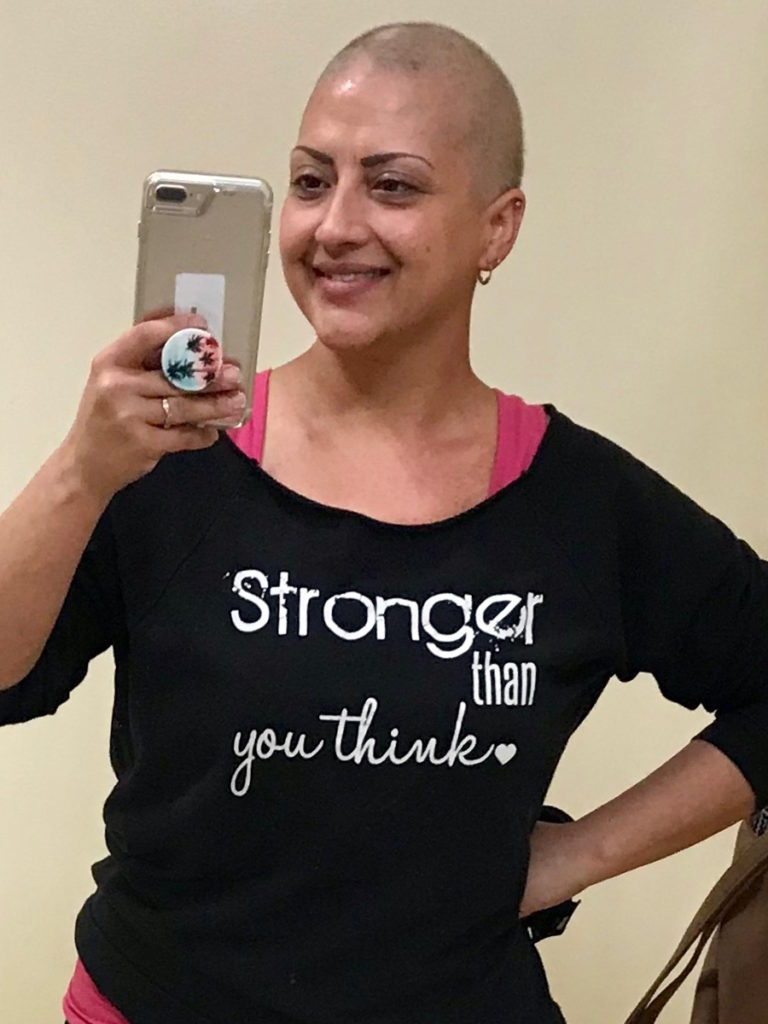
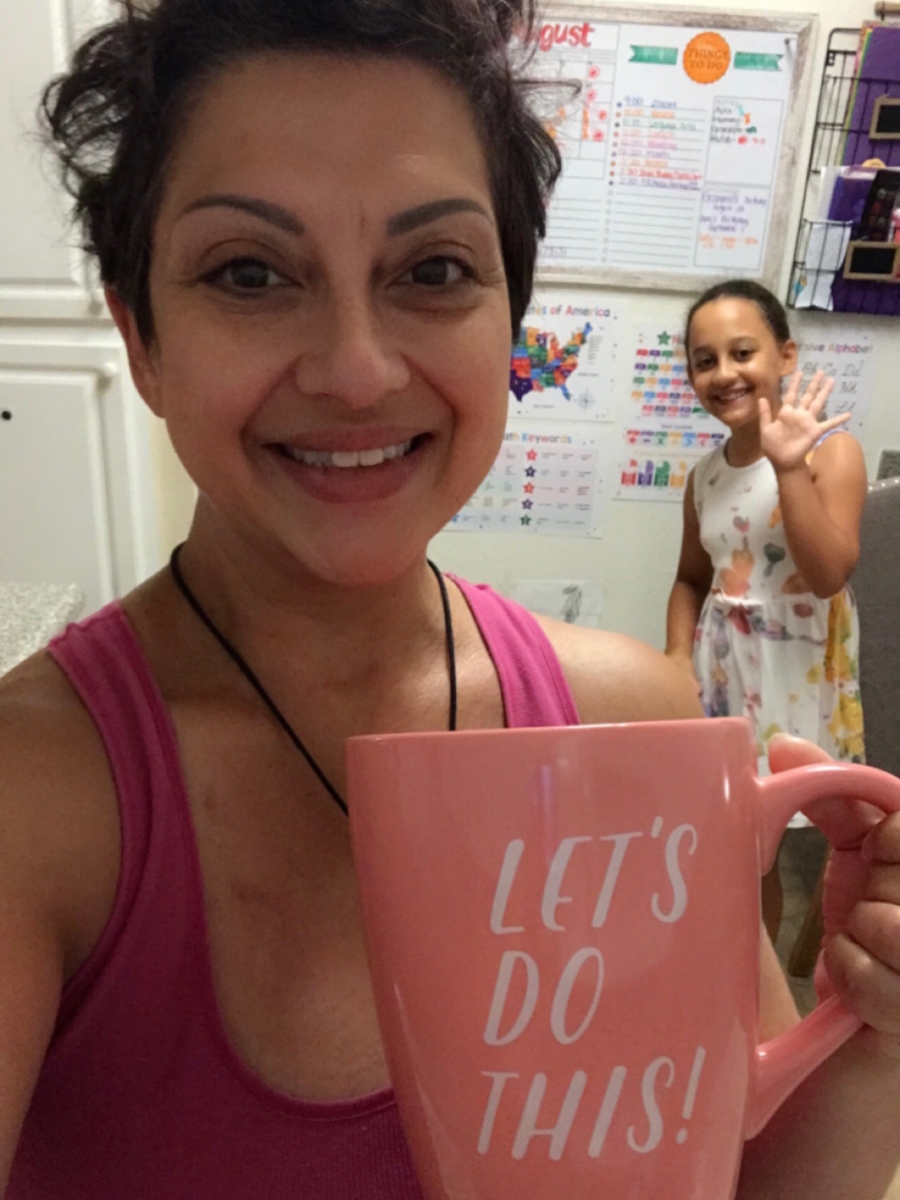
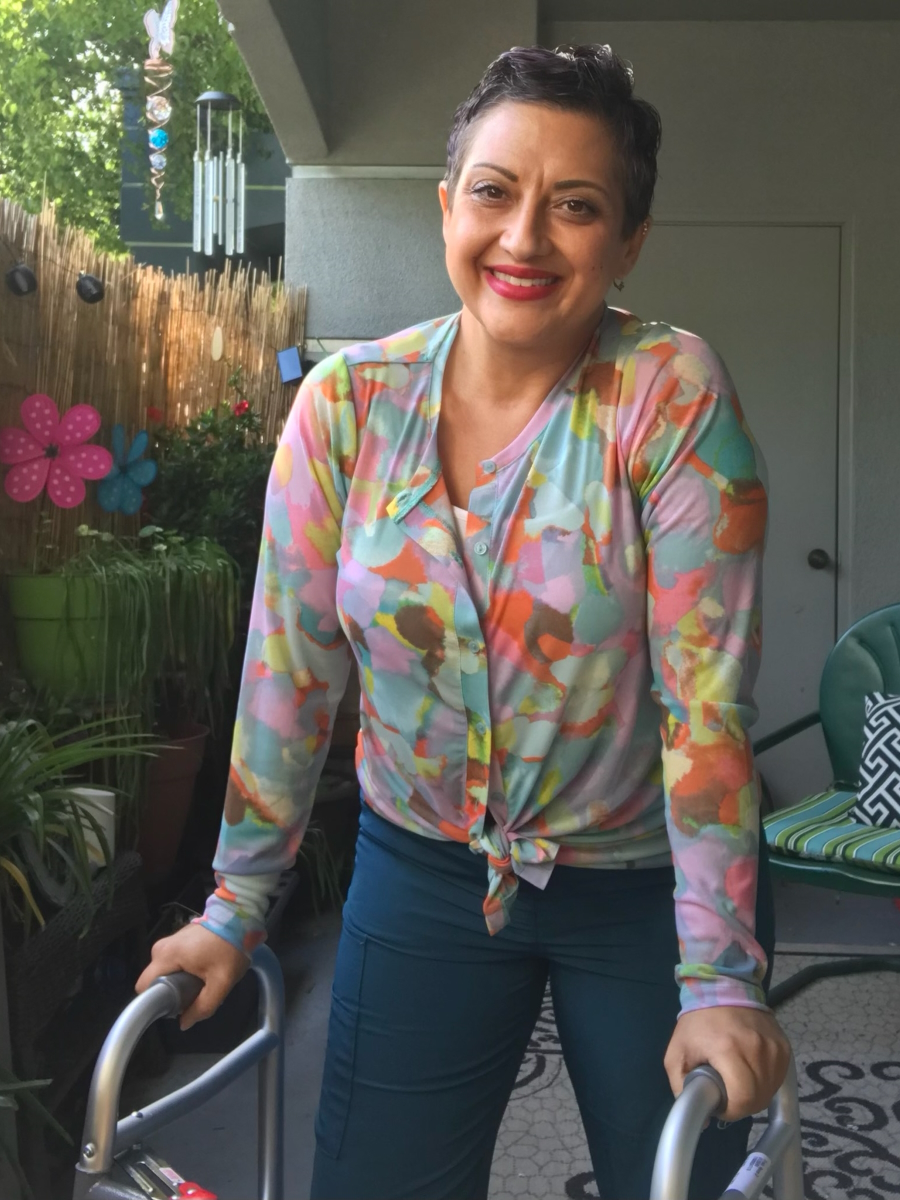
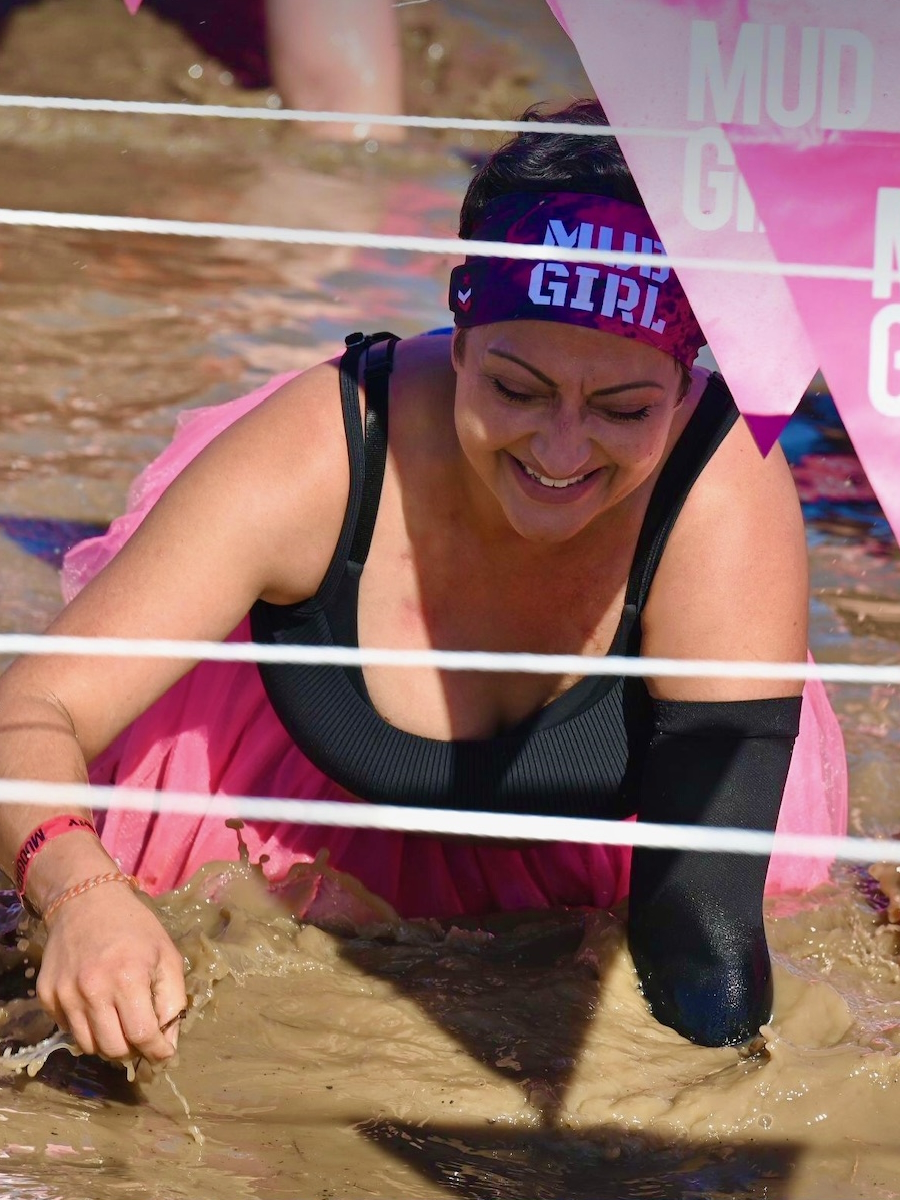
Tell me I can be angry. Tell me it’s okay to be upset. Then tell me I’m strong… No matter how hard this might be, even if I’m on the floor in the fetal position, feeling desperate and clinging to life, I’m still clinging to life and that is to be celebrated.
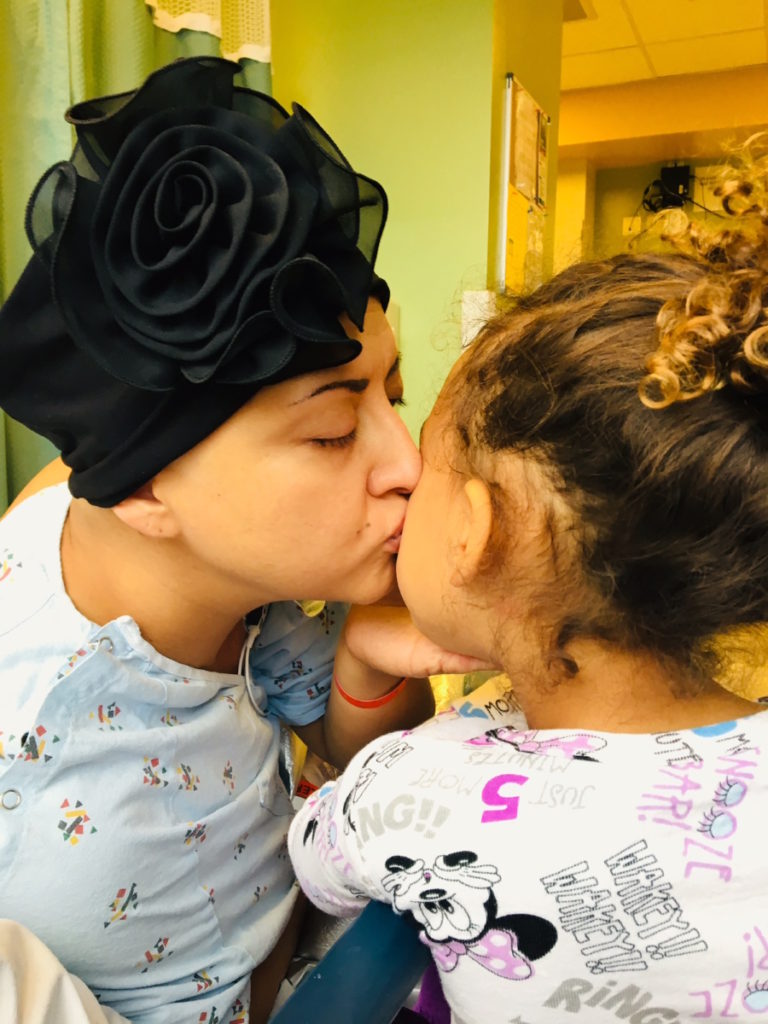
Breaking the news to my daughter
Having my five-year-old and facing the biggest fear that I had being a parent — what do I do if this comes back? — I had to embrace it as best as I could and explain it to my kid without terrifying her.
I was teaching preschool and told her, “When you make artwork and you add glue, paint, and glitter to things, sometimes it gets really messy. You can’t go over and erase glue and glitter. Sometimes, you have to just start over. If you look at people, we’re made of glue and glitter. Sometimes things get a little messy and that’s why there [are] doctors. They come in, erase the board, and clean it up so that you have a new space to create something new. And that’s basically what mom’s going through.”
I had a unilateral mastectomy so it means that I had just one breast removed, mostly because we needed to hurry up and get started on treatment.
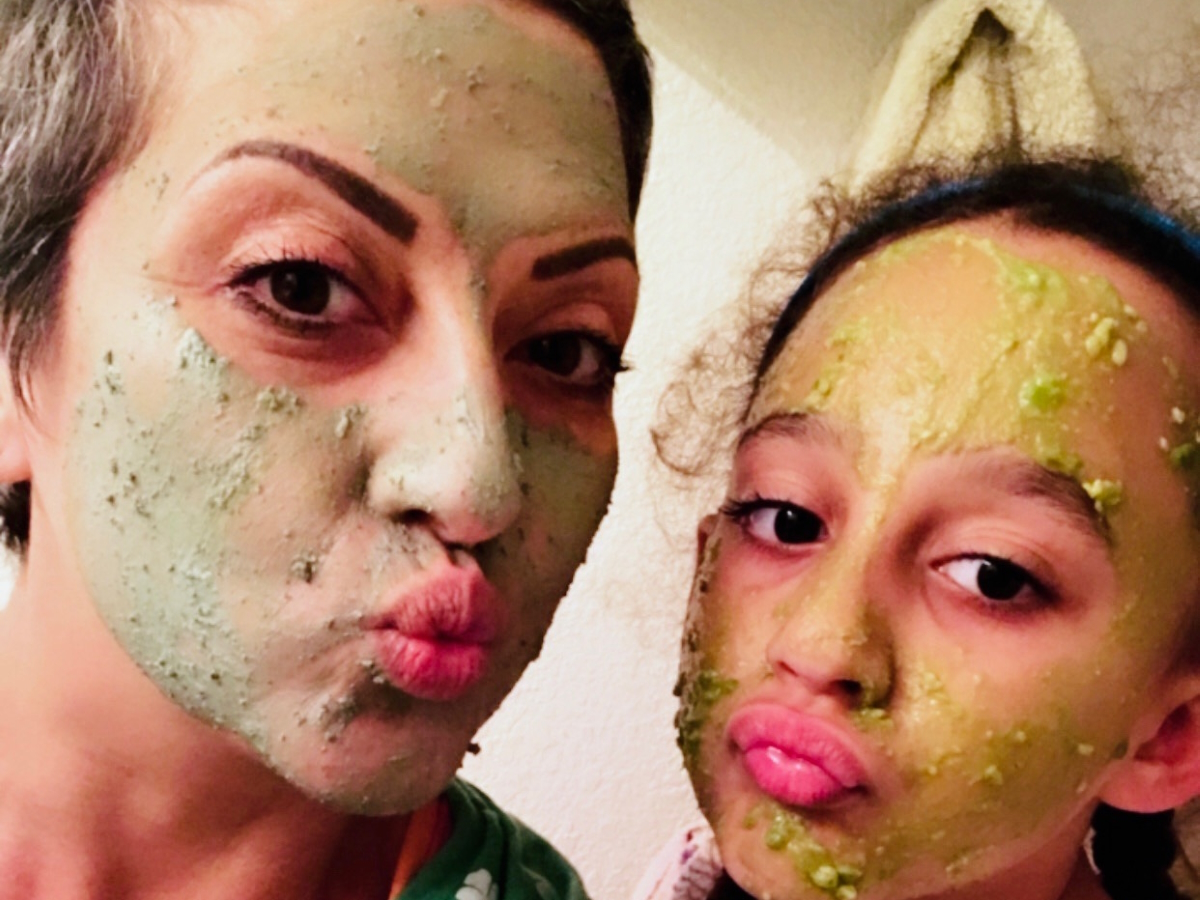
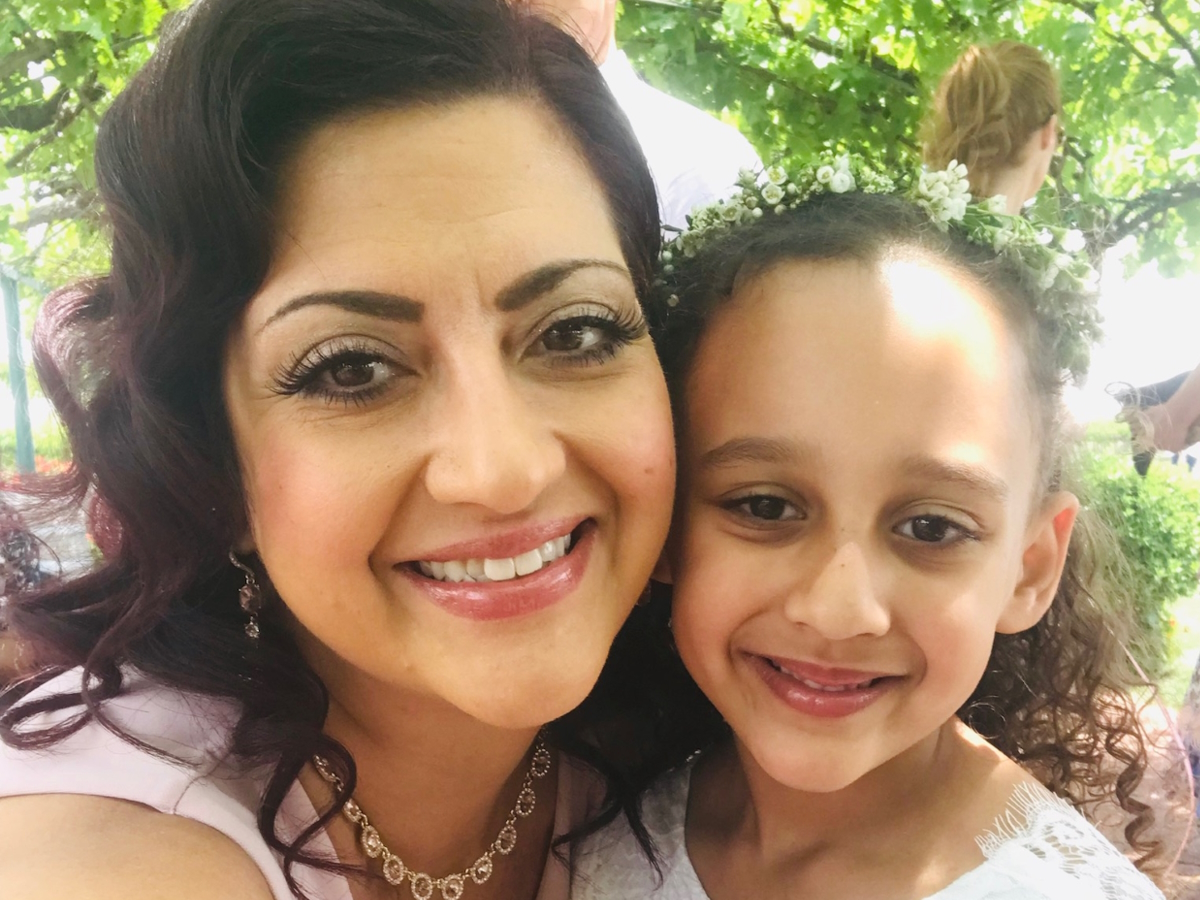
Side effects from treatment
Hugging my daughter was different. It changed. Those were things that I wasn’t really expecting to deal with.
Hair loss? I knew that was coming so I wasn’t going to sit around and wait for my hair to fall out. I started cutting it and then we shaved my head.
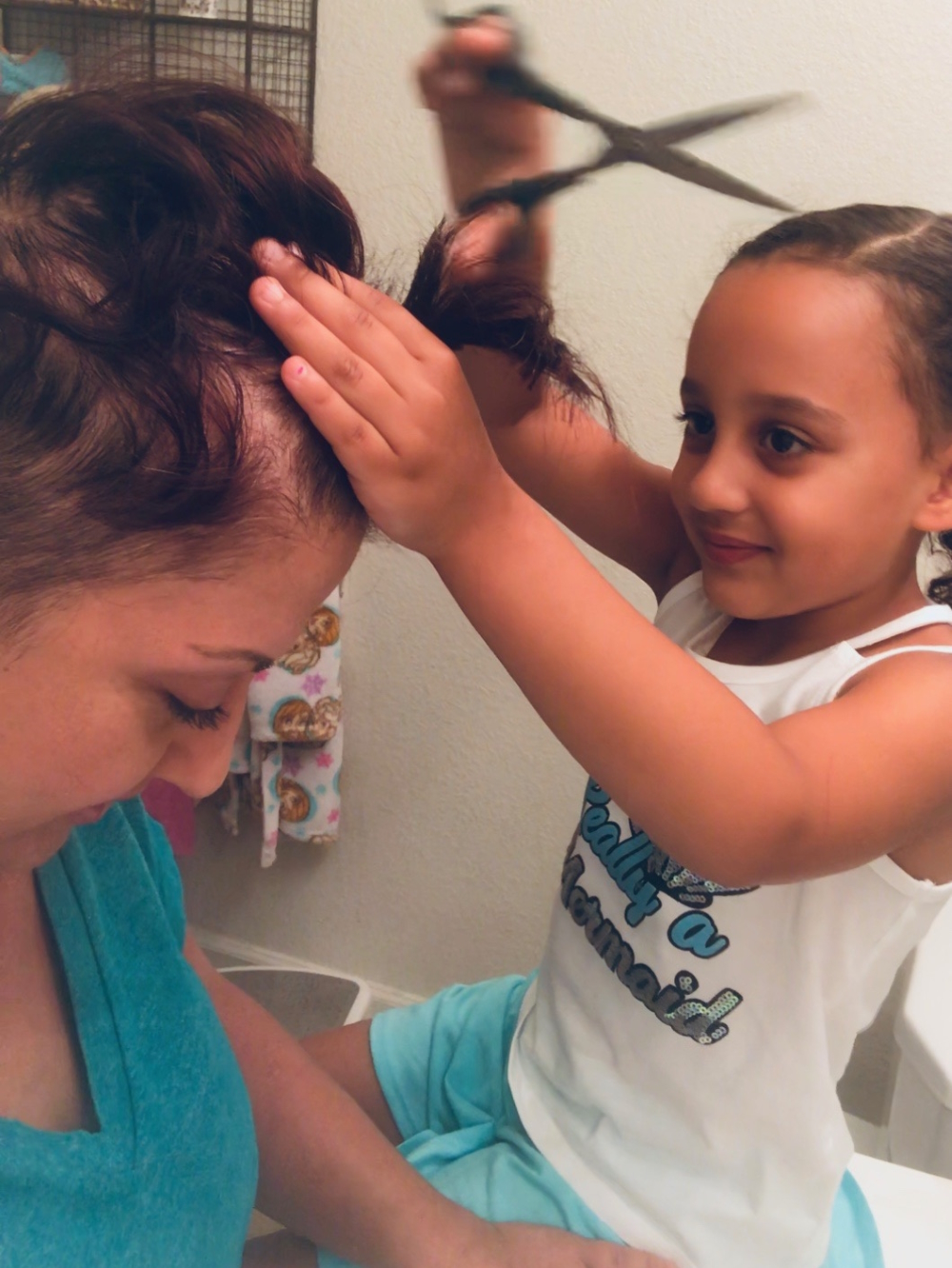
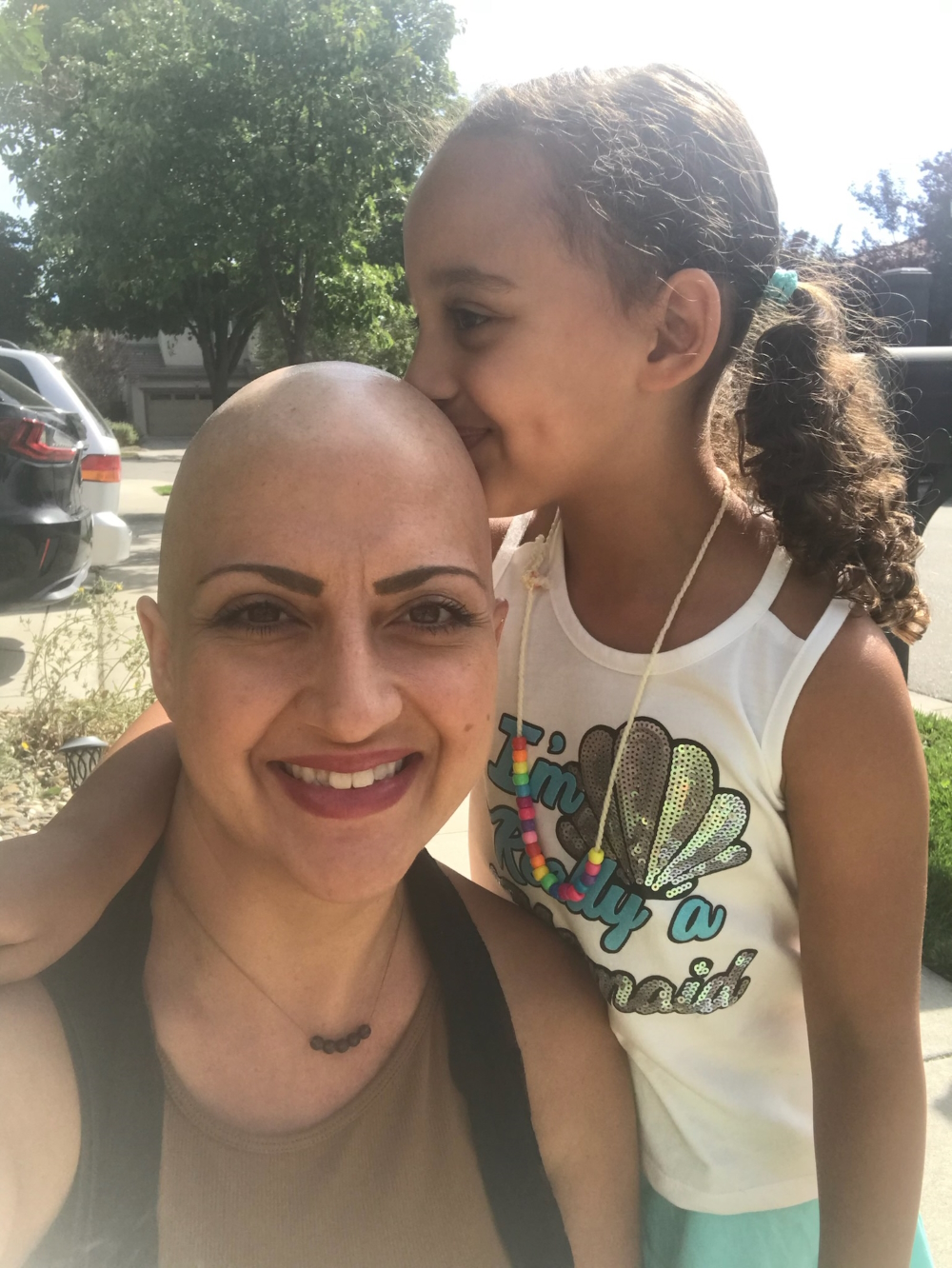
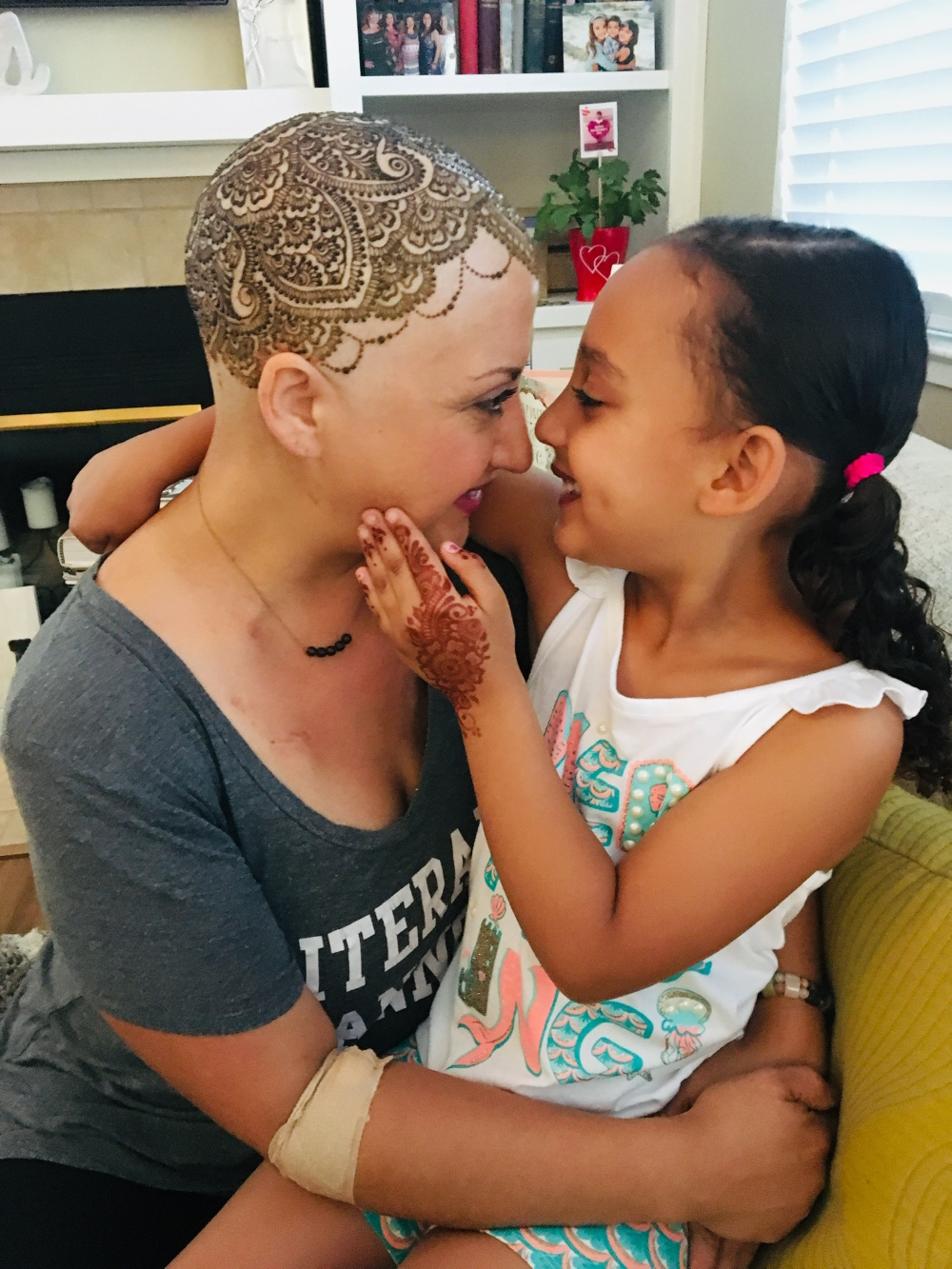
My daughter and I got henna tattoos. I got one on my head and continued to get henna tattoos because, from my previous experience, wigs were not comfortable for me. I didn’t like the feeling and it was hard to wear my masks.
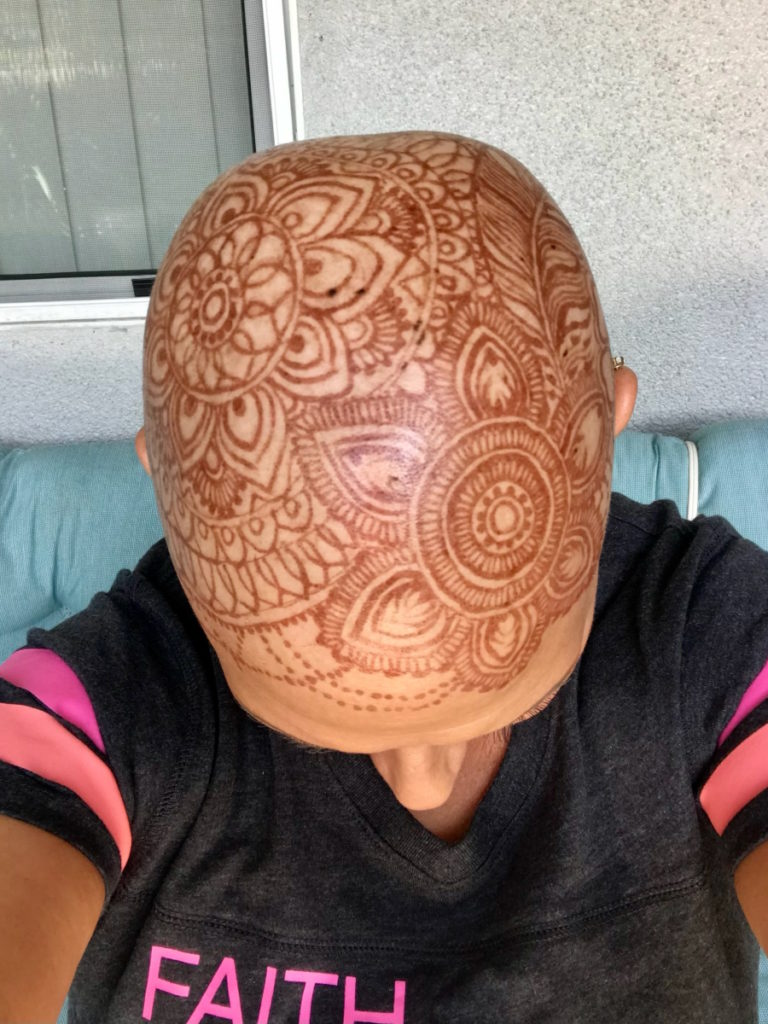
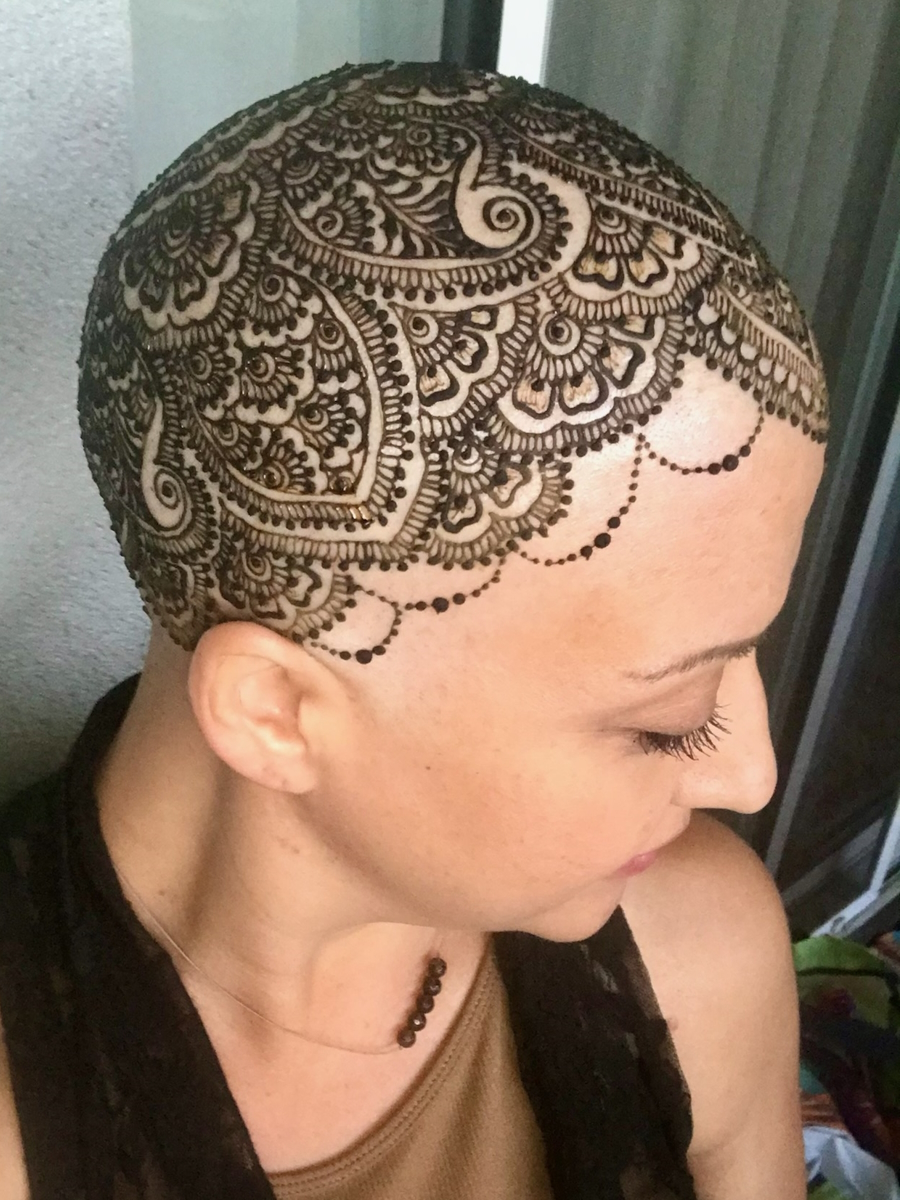
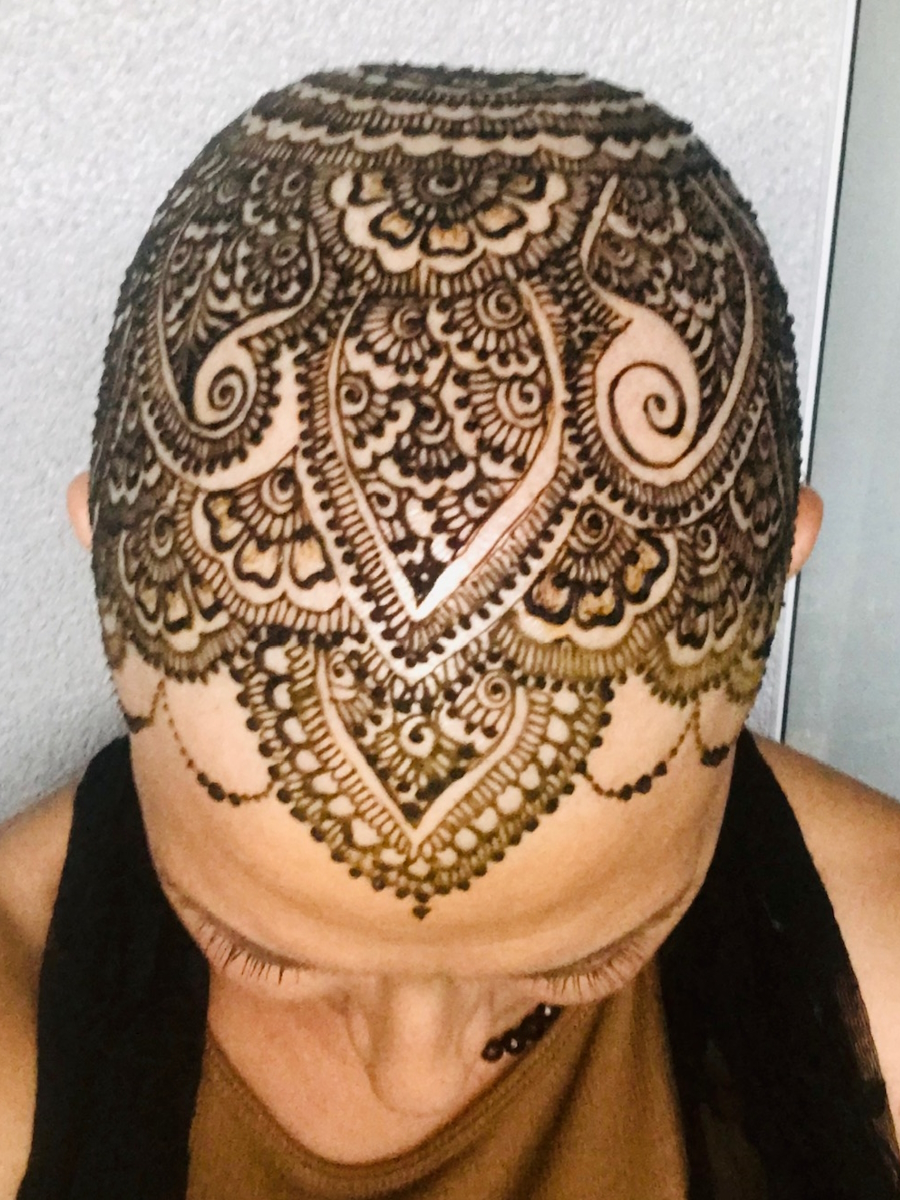
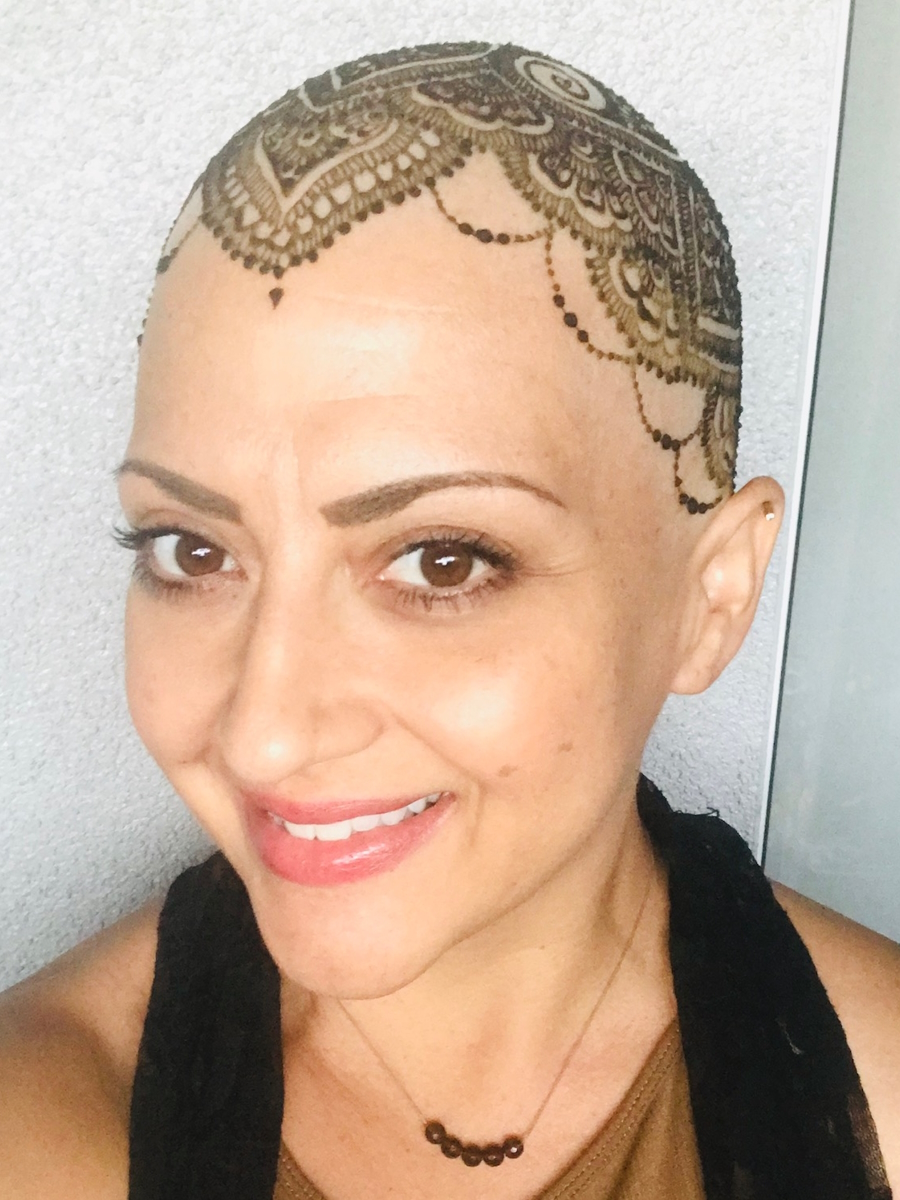
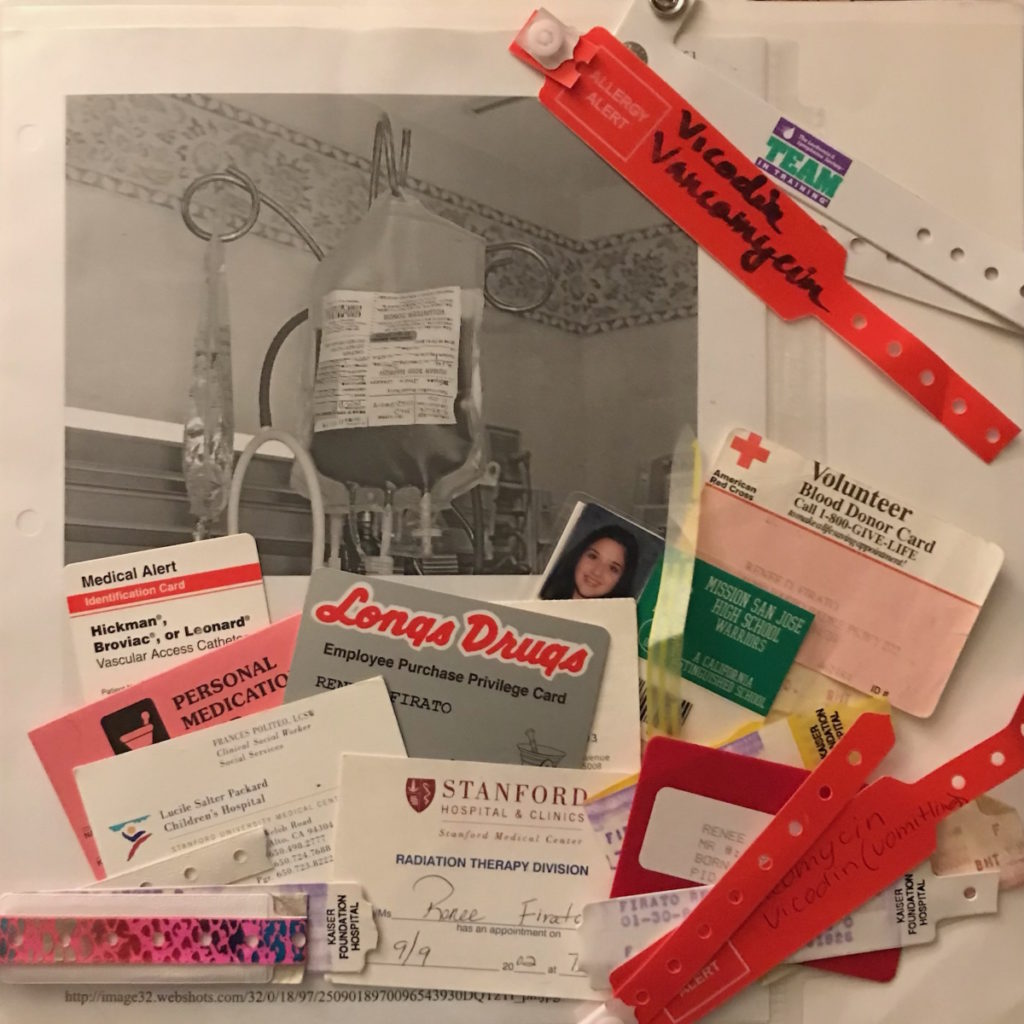
What did you learn from going through leukemia that helped you?
As far as being prepared and using some of what I have learned from leukemia to help me with breast cancer, it was the hair, the food train, and financial resources. But the emotional stuff, I was not prepared for.
It took me a long time to realize that a lot of the things that I was doing in [the] clinic were from [my experience with] leukemia, like instantly asking for a warm blanket. That solidifies that I’m really here. This is really happening. I know my way around. This warm blanket brings me some comfort because I know what to ask for. In the cafeteria, I also know to ask for vanilla ice cream instead of applesauce.
Sometimes you need to have a moment with nature to remember [that] you’re just this small little stardust in this great, huge world. There’s surviving and thriving all around you.
What helped you process your breast cancer diagnosis?
Mindfulness practice is huge. I didn’t realize how. I’m an Aquarius so I love water and anything related to water, but I didn’t realize how much that impacts your emotional wellness and stabilizes some of these things.
When I was going through leukemia, I would listen to [the] sounds of the ocean. I’m locked in this room. I can’t leave. I’m bedridden.
My mom would fill the basin with ice-cold water, rocks, and shells that I had from my collection, and she’d swoosh it back and forth for me. I just closed my eyes, put my hands in the basin, feel the waves, trance out, and go where it doesn’t matter.
It’s still something I practice. It’s still something that I hold on to. I have a fountain in my yard. I love the rain because it’s just so beautiful.
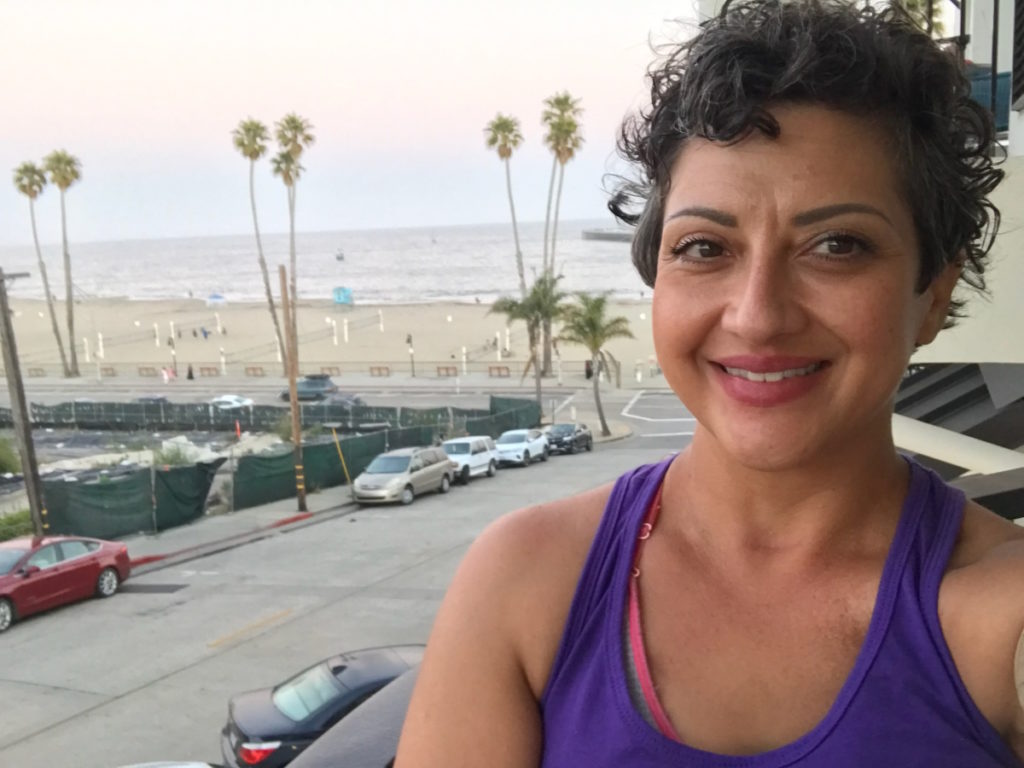
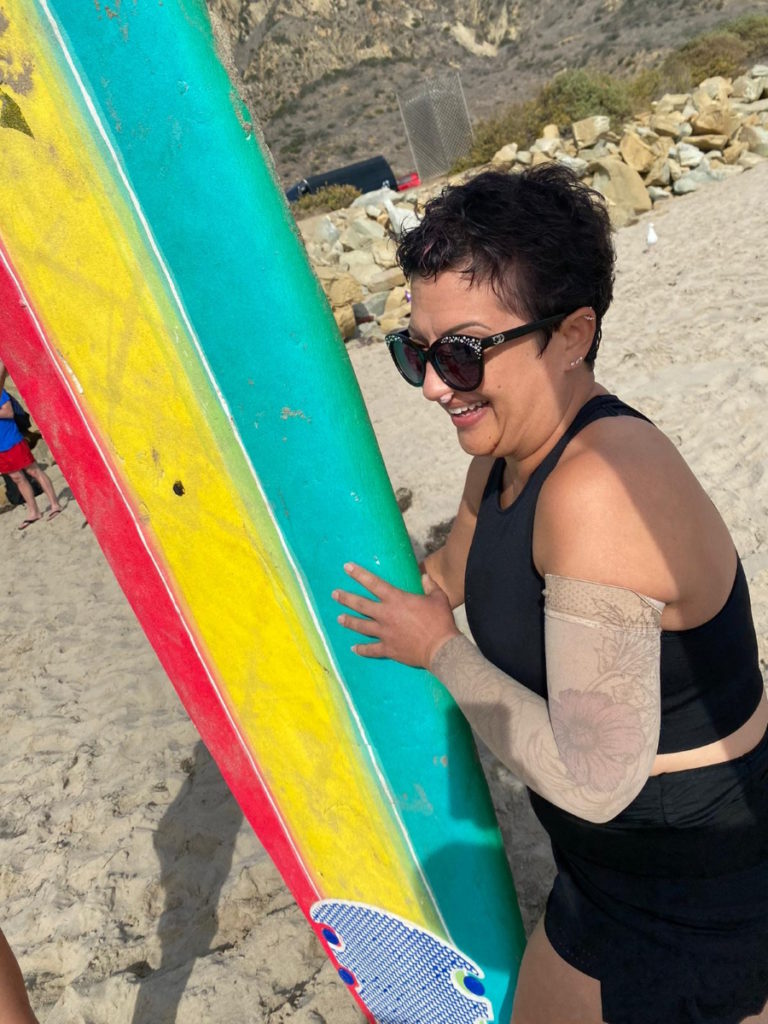
I went surfing for the first time and in an instant of wiping out and bleeding in the ocean, I realized my cancer doesn’t matter. Cancer doesn’t matter [at] this moment. If a shark really wanted to eat me, he’d eat me. He doesn’t care if I have cancer.
Sometimes you need to have a moment with nature to remember [that] you’re just this small little stardust in this great, huge world. There’s surviving and thriving all around you.
The moment that I realized that there is peace [in] being in nature was the moment that I realized that I see hearts in clouds. I see hearts in leaves. I see hearts in rocks. I see hearts constantly in nature. I feel like it’s some type of validation or affirmation. You’re part of this, too. Keep growing. Keep being in this moment.
When you’re submersed in nature and captivated [by] the mystical beauty of it, you start to forget your problems and then you start to breathe. It feels so invigorating, [like] that feeling after a good workout.
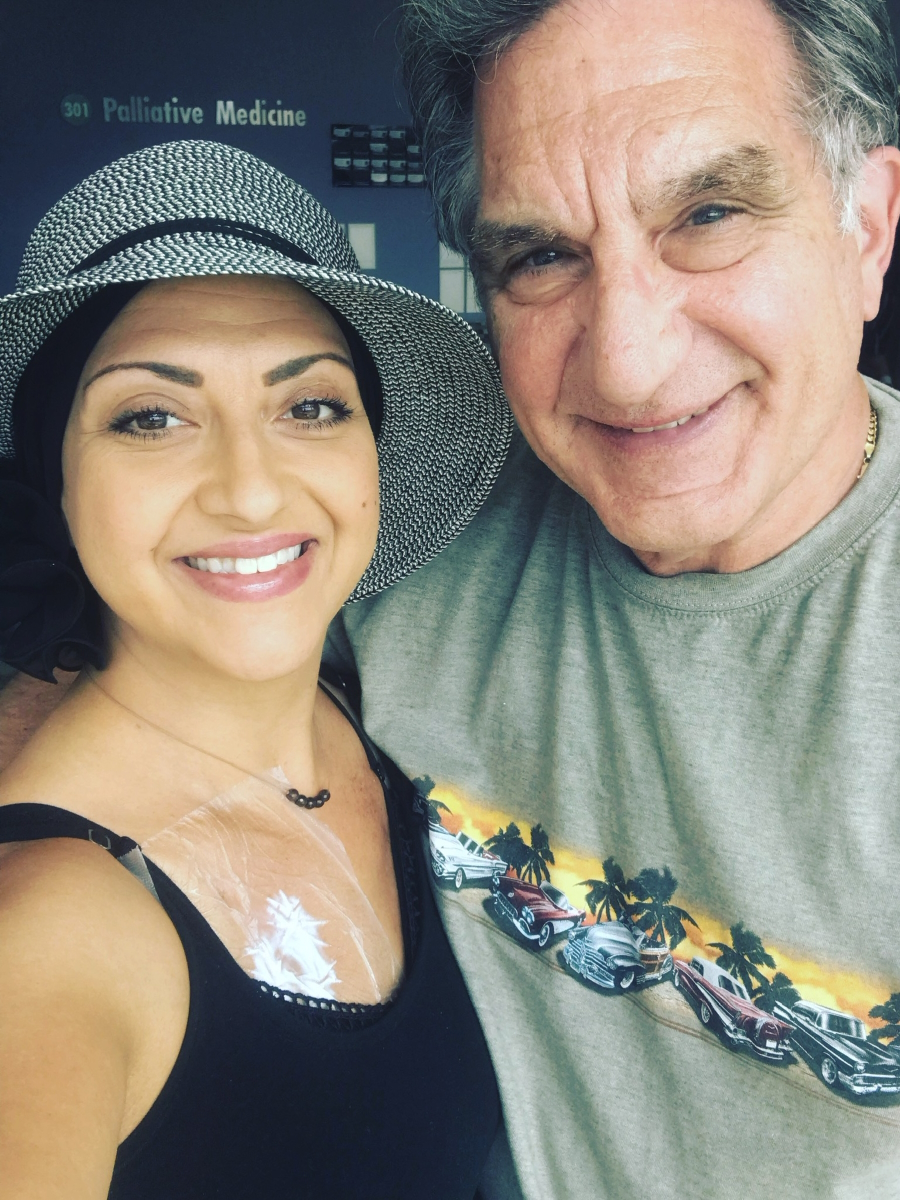
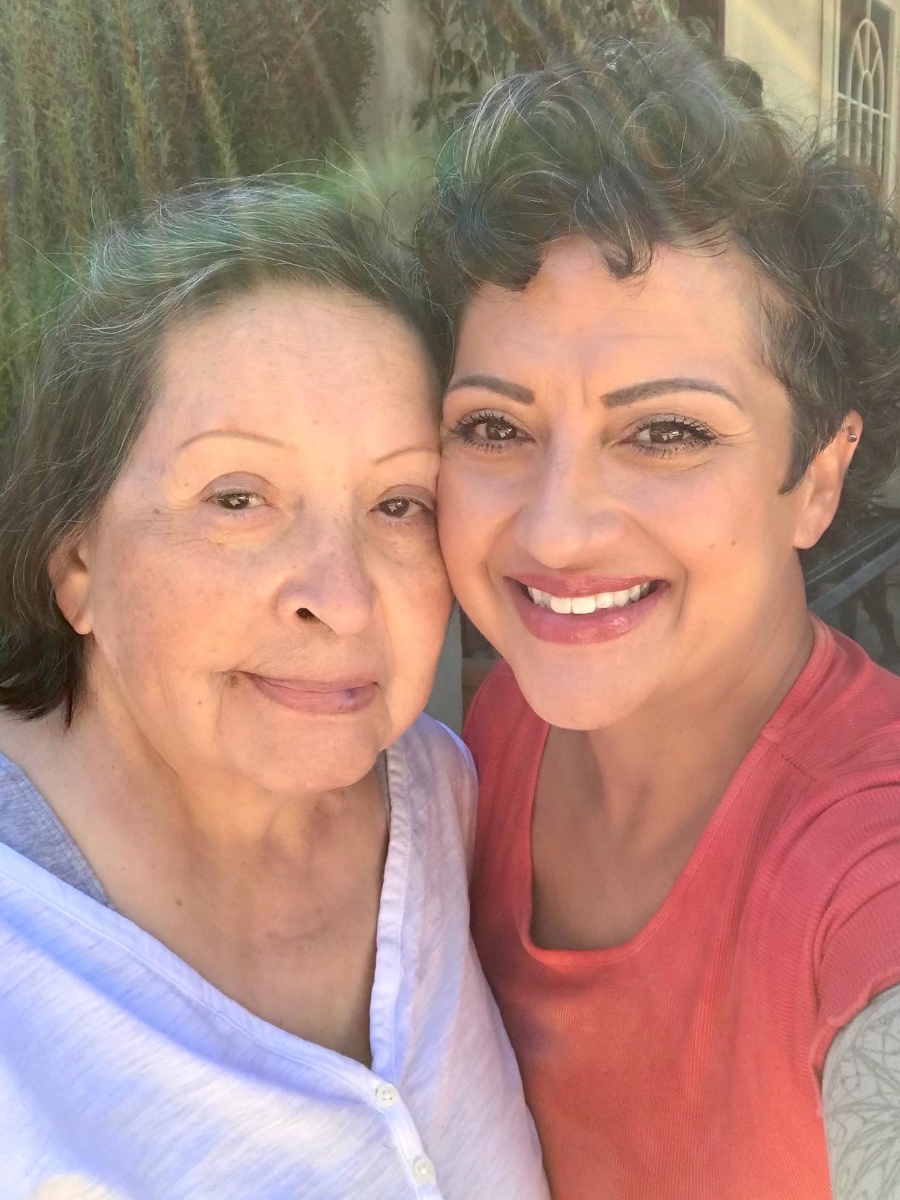
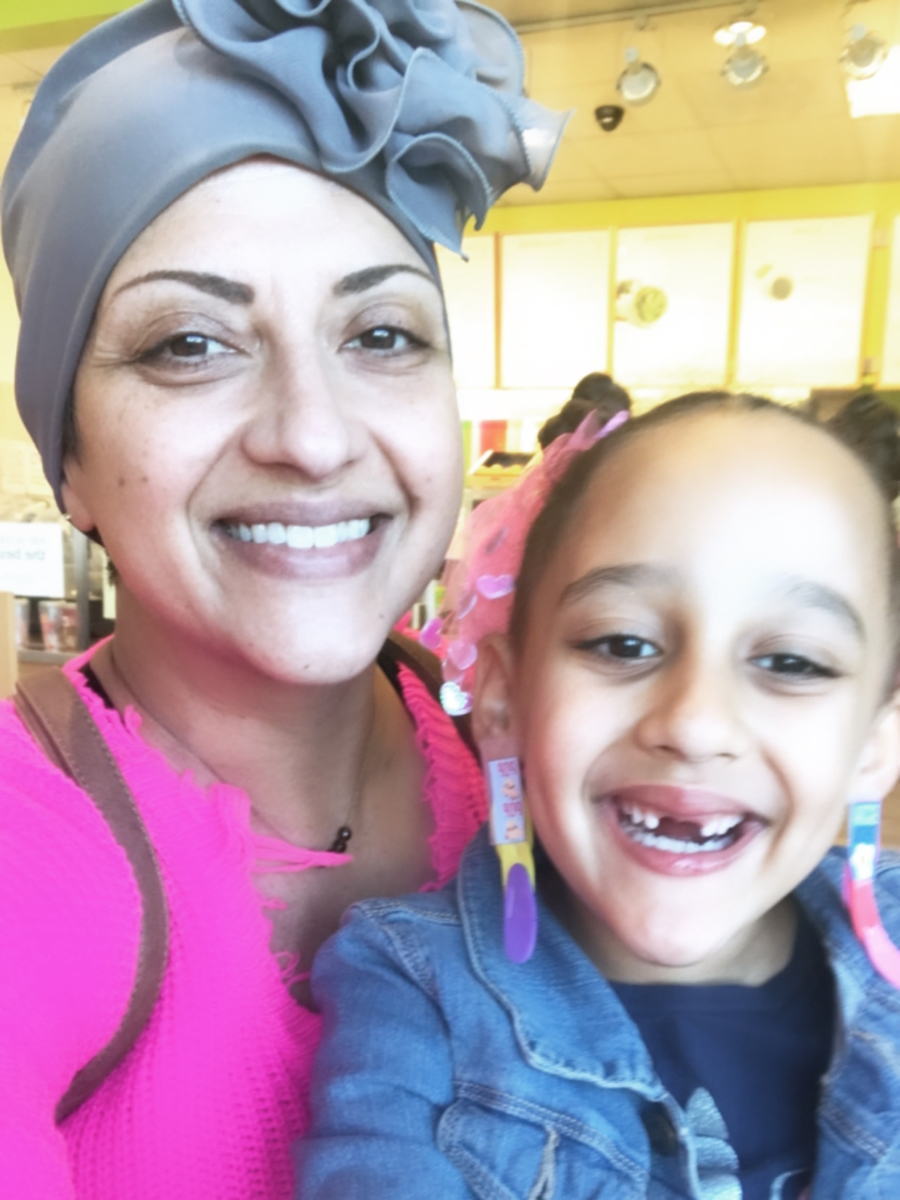
What happened after you got a unilateral mastectomy?
Due to the timing, with my history and everything, we had to do surgery right away to eliminate the problem as much as we could physically and then attack it with medicine. We rushed in and did a unilateral mastectomy and removed the entire left breast and my lymph nodes on the left arm.
As soon as I recovered from that, I started chemotherapy again. I was on Taxotere and Cytoxan. I had to do home injections as well so it was paired with chemotherapy. That was for about six months.
I had six rounds total of chemo then I had targeted radiation to the chest and parts of my arm. I had about 25 sessions of radiation and then started the process of healing.
In 2020, we did a scan to check everything. There [were] markers in the right breast, but the findings weren’t as aggressive as what we discovered in the left breast. When we did that scan, it revealed that I actually now would also need my thyroid removed. There [were] tumors there as well. It was just safer to remove the entire thyroid and not leave parts of it.
I had chemo and radiation again, a ton of surgery, only to find out that we were going to go take something else. And that was in the middle of the pandemic, too, so it was terrifying.
They removed the thyroid. I’ve had no problem since then and I’ve been on this long-term hormone, anti-cancer regimen for the last couple of years and I’m on it for a few more years. I think I get off in 2024.
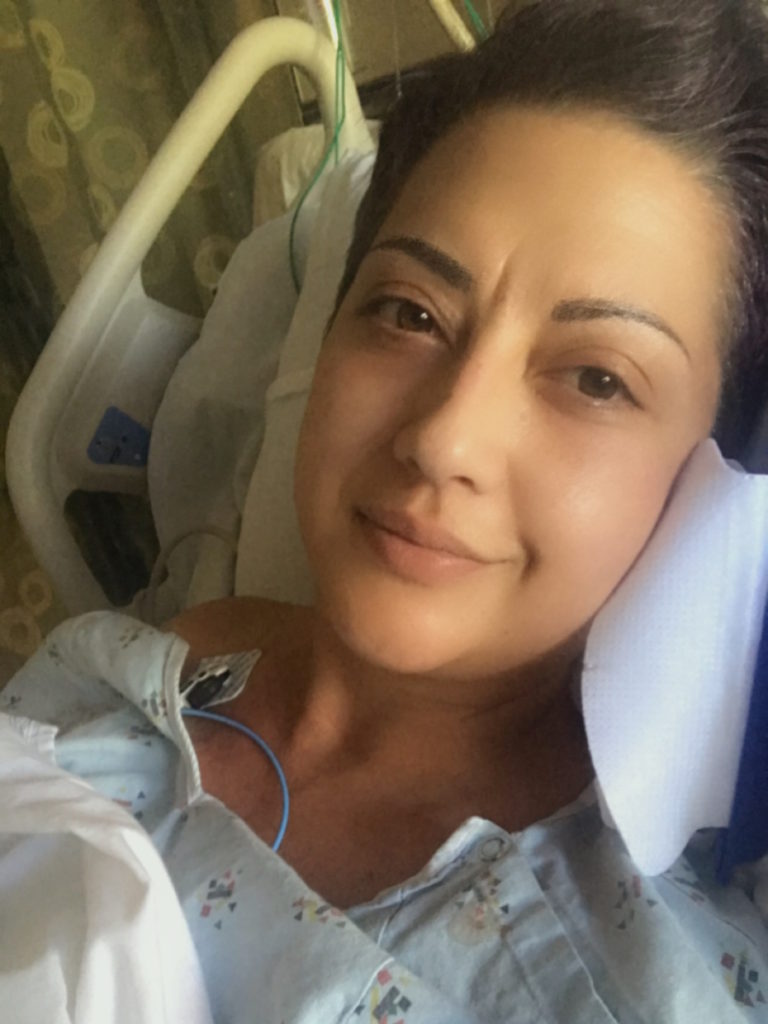
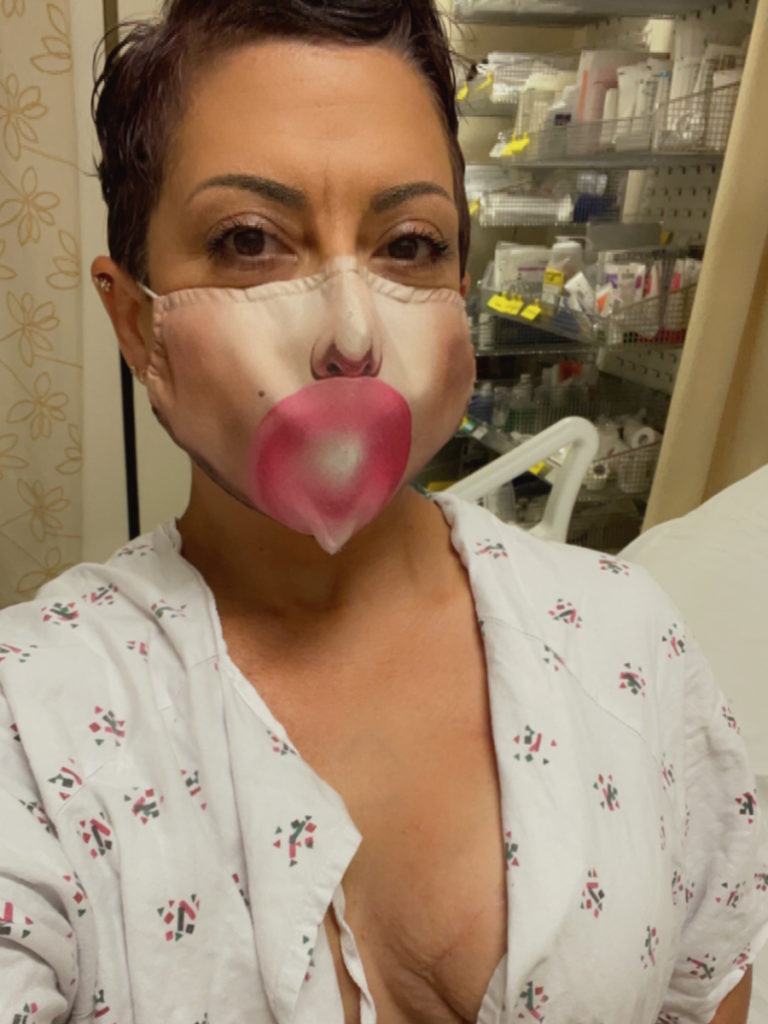
[In] April [2022], I was finally stable enough, health-wise, to have a finalized mastectomy and DIEP flap reconstructive surgery. Because of all my radiation and how much they had to remove from the chest wall, implants were not an option for me.
DIEP flap surgery is grafting different parts of either your back or your abdomen to make boobies. They were able to graft my abdomen, move it all up, and do a full reconstructive surgery.
The right side gave me a ton of problems and I’ve had a bunch of complications since then — necrosis and staph infections. I’m still bandaged [after eight months], but I’m getting there. I’m almost done healing and I have a normal-ish-looking body again. I don’t have to wear a prosthetic breast anymore, which was a whole lane to walk down, too.
At this point, things are stagnant and that’s a good thing. My health is stable. The treatments are working. My blood looks great. Still anemic like usual, but everybody’s acting right.
I don’t consider myself cancer-free. I consider myself a survivor but more than anything, I consider myself a thriver.
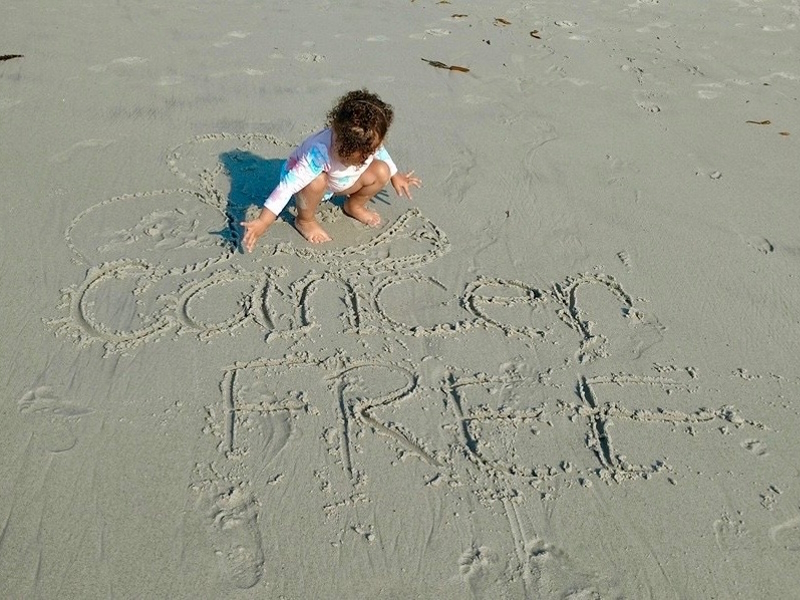
How do you feel knowing that everything is good and stable?
To be honest, mixed feelings because it’s this basket of hope, like, “Yehey! I get to get on with my life again, move on, figure out what life is like with my stomach is my boobs now, and rebuild [and] re-plan my goals.”
But on the other side, it’s, “All right. Is this the calm before the storm? What’s next? If we’ve removed parts that I can function life without, what do you come for next?”
I don’t consider myself cancer-free. I consider myself a survivor but more than anything, I consider myself a thriver and that’s where I associate myself with my health and [the] long term.
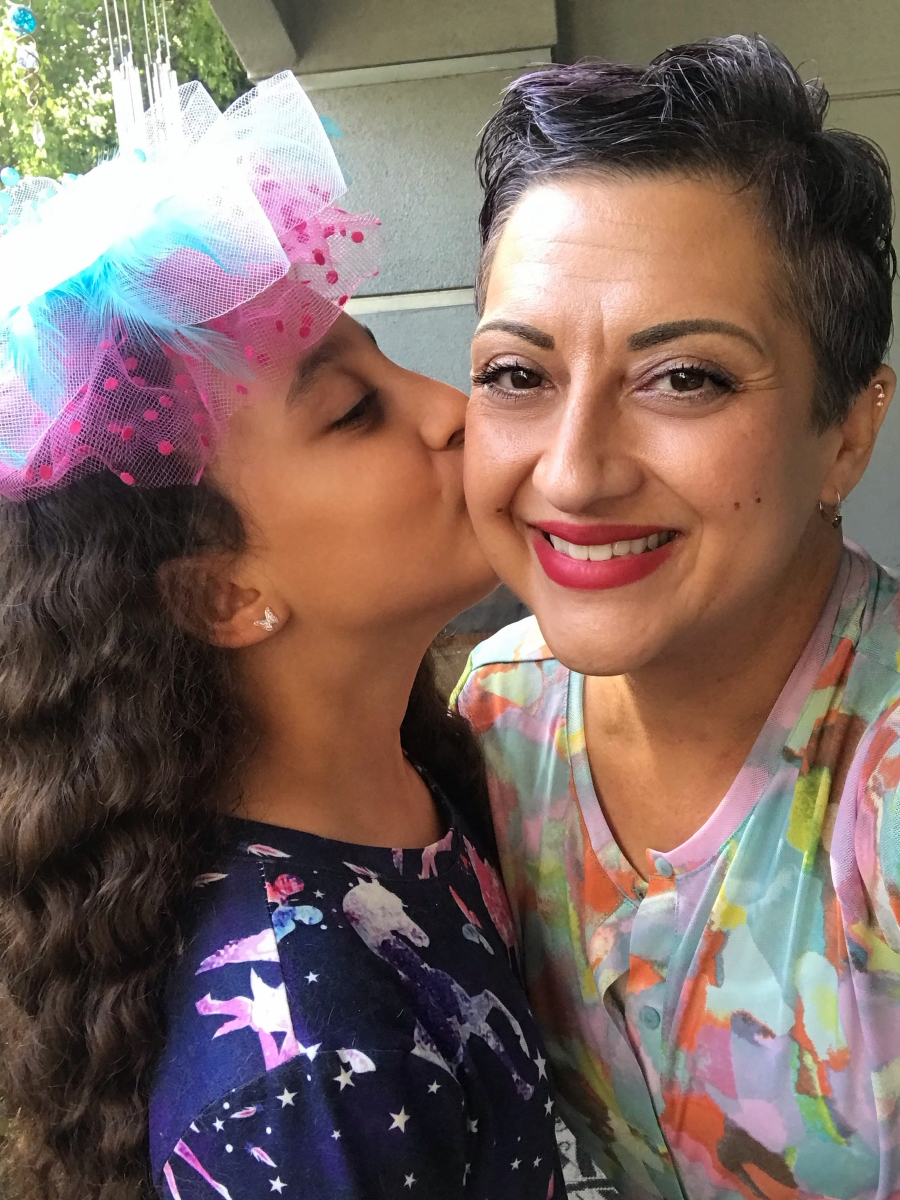
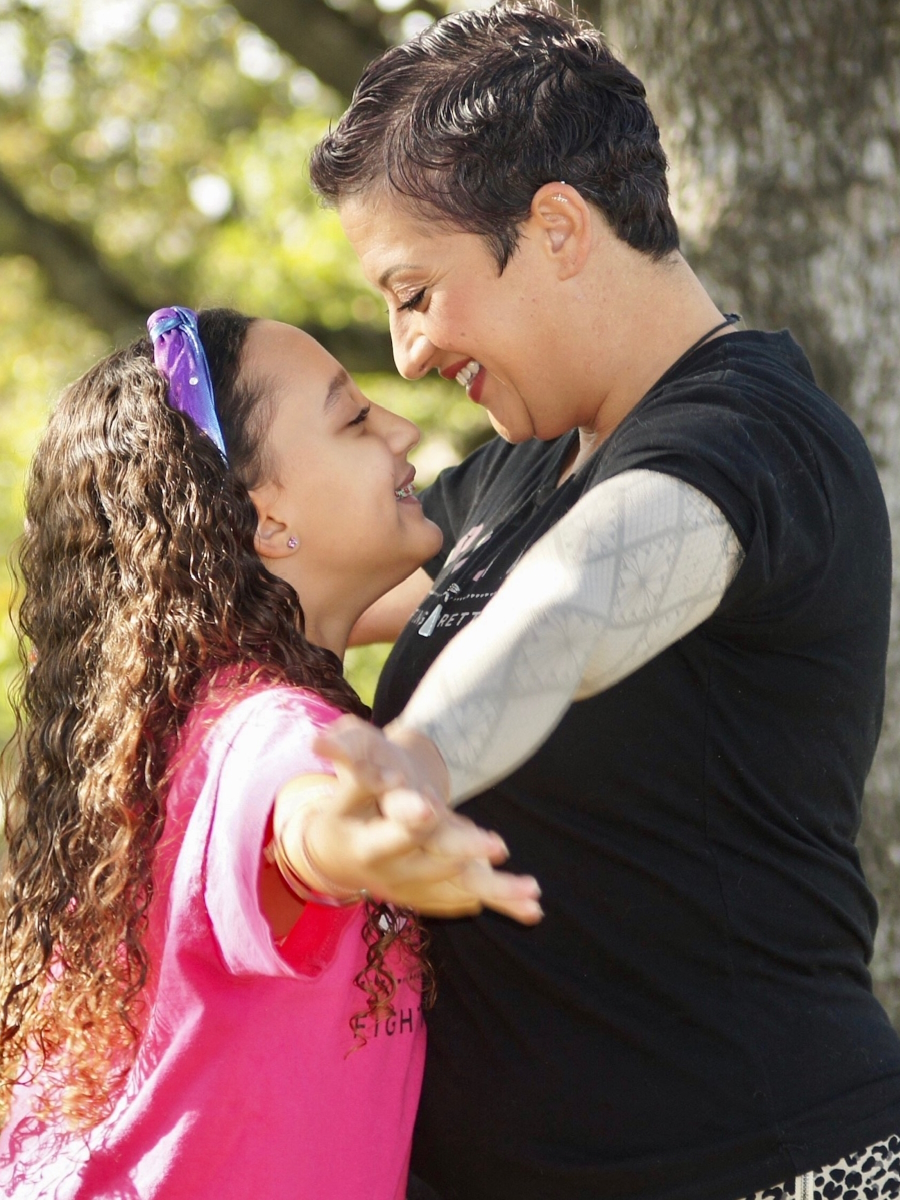
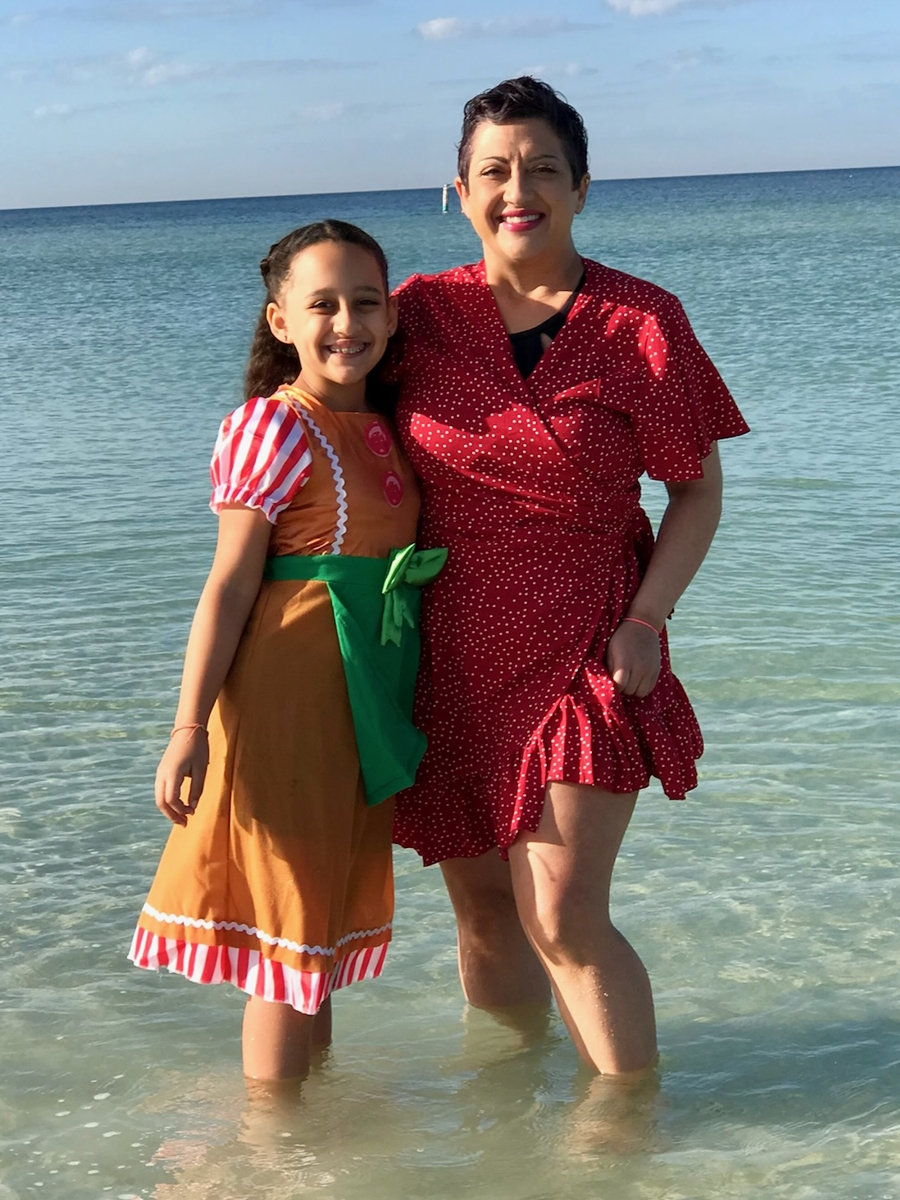
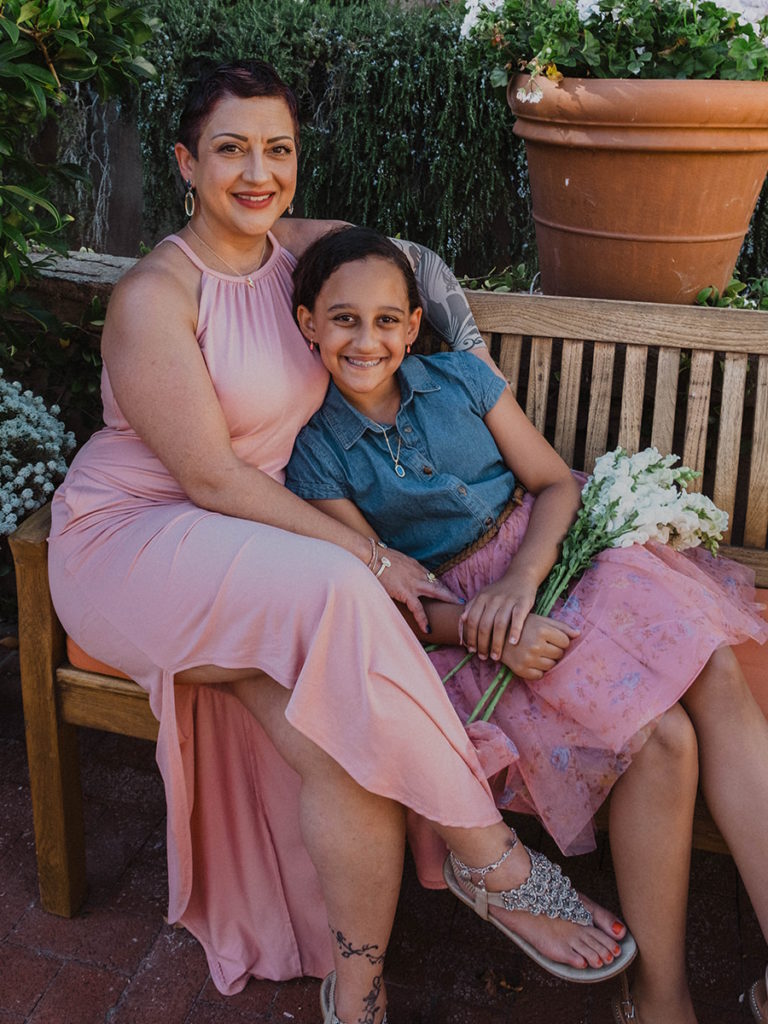
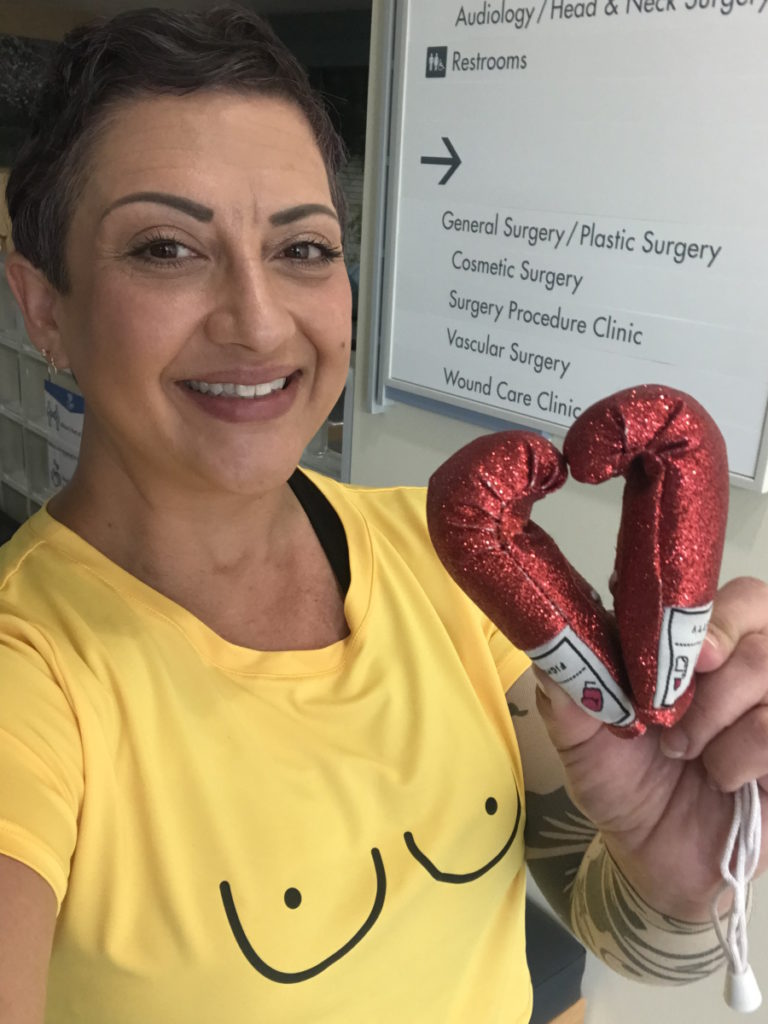
Words of advice
Don’t stop dreaming. I know it sounds so cliché. Make that vision board. If you focus on living in all ways, then you remove the stress, fear, and worry.
I have plenty of days where [I’m] down and mopey and all I can do is sit on the couch. But I know that there will be a day [when] I have energy and I’m out there, living, touching, tasting different things, and feeling the world. It’s okay to have both days.
Just because you’ve been diagnosed with cancer doesn’t mean it’s over. It’s not over yet. You’re not dead yet. When it gets too much and nature doesn’t work or listening to music doesn’t work or talking to somebody doesn’t work, my best advice is [to] go clean something.
Organize something. Accomplish a small, achievable task. You can polish it up. You can reorganize it. You will take pride in that. Then all of a sudden, dopamine and serotonin and all these things start running through you because you achieved.
Whatever stage you are in and whatever year in your journey you are in, may I remind you: you’re still here. You are still thriving. Even if it was a hard day yesterday, you’re here and that is to be celebrated and enjoyed.
I have never been good with body image and loving myself the way that I look and who I am in my skin until I got breast cancer. Then I started really, really loving the fact that I heal really [well] from things that try to destroy me.
When I get caught up and it really takes a toll on my emotions or my finances, I have to remember how much I heal. I have to touch my scars and remind myself: we rebuilt. Sometimes you need to touch your scars to remind yourself that you’re still here and you’re a freaking badass.
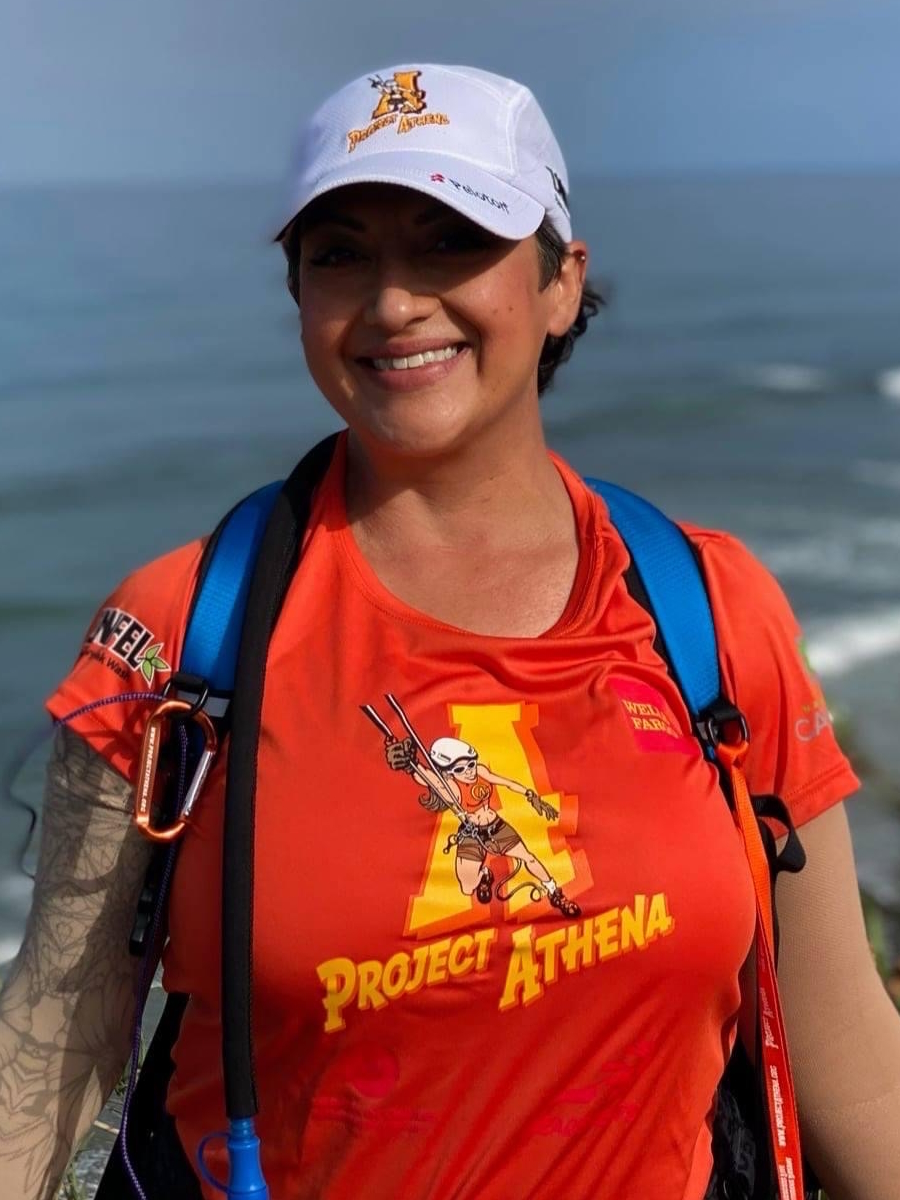
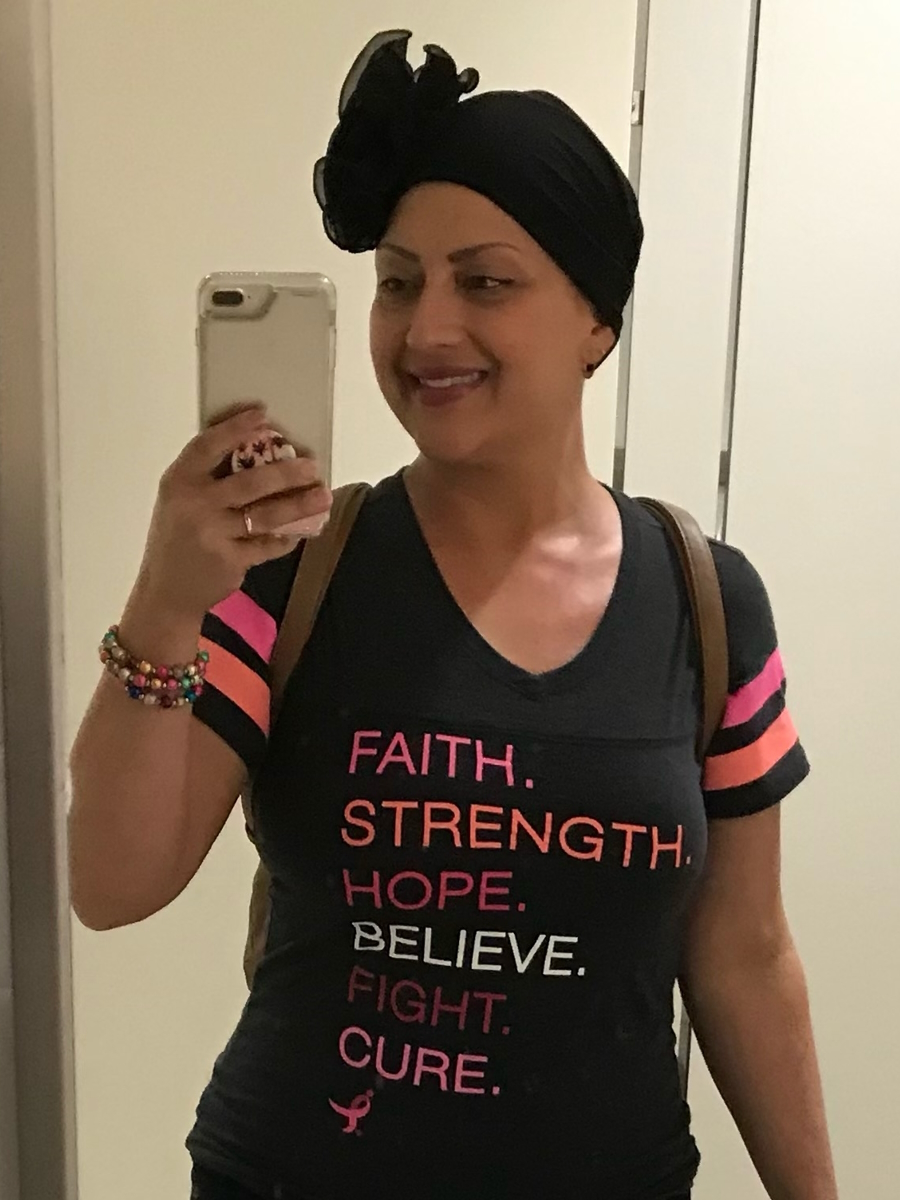
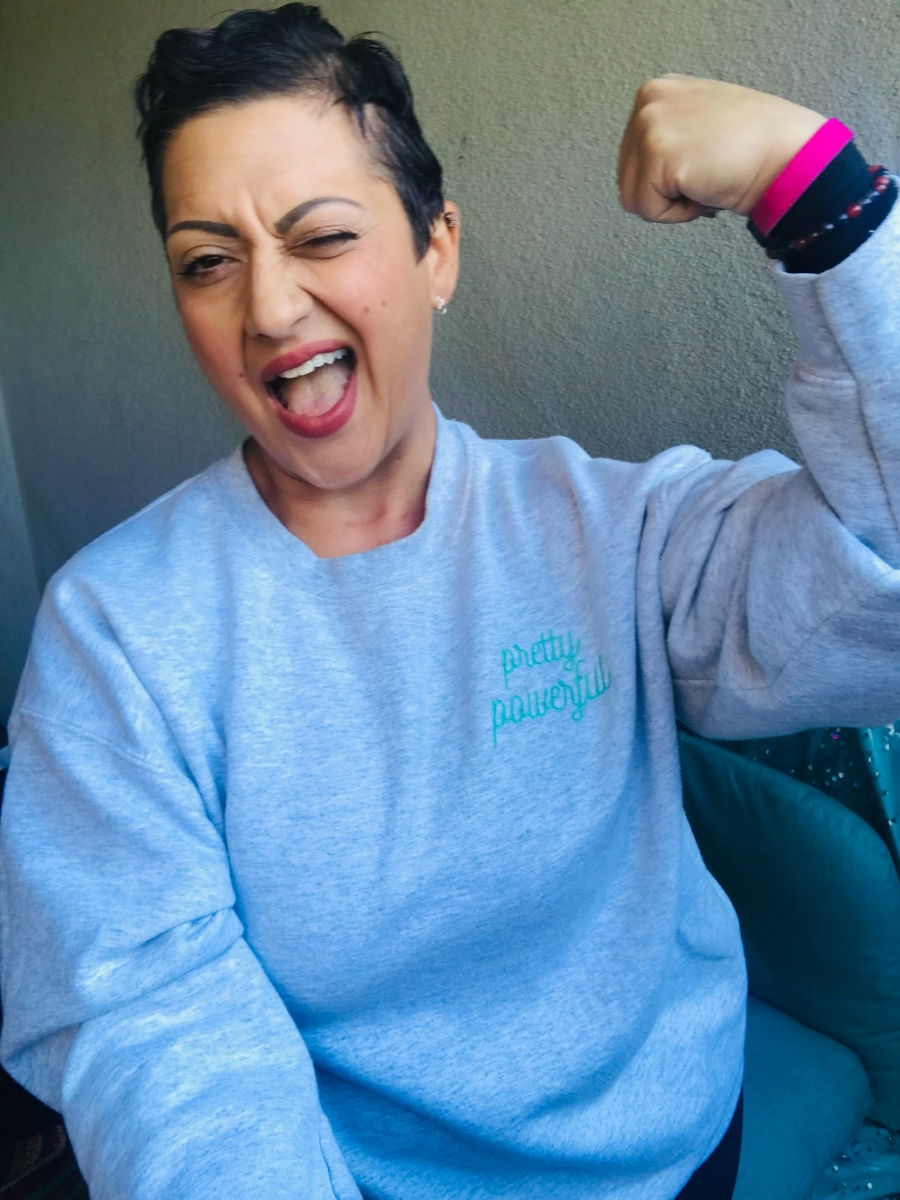
If you focus on living in all ways, then you remove the stress, fear, and worry.
Renée was 18 when she started noticing bruises but she was on the cheerleading and dance teams so she just associated the bruising with those. After she had her wisdom teeth removed, her health rapidly declined, prompting her mom to bring her to the hospital. She shares her story of how her cancer journey began.
Read Renée’s acute myeloid leukemia story here »

Inspired by Renée's story?
Share your story, too!
Metastatic Breast Cancer Stories
Tammy U., Metastatic Breast Cancer, Stage 4
Symptoms: Severe back pain, right hip pain, left leg pain
Treatments: Surgeries (mastectomy, hip arthroplasty), chemotherapy, radiation therapy, hormone therapy, targeted therapies (CDK4/6 inhibitor, antibody-drug conjugate)
Nicole B., Triple-Negative Metastatic Breast Cancer, Stage 4 (Metastatic)
Symptoms: Appearance of lumps in breast and liver, electric shock-like sensations in breast, fatigue
Treatments: Chemotherapy, surgeries (installation of chemotherapy port, mastectomy with flat aesthetic closure), targeted therapy (antibody-drug conjugate), hyperbaric oxygen therapy, lymphatic drainage
Dalitso N., IDC, Stage 4, HER+
Symptoms: Appearance of large tumor in left breast, severe back and body pain
Treatments: Surgery (hysterectomy), vertebroplasty, radiation therapy, hormone therapy, clinical trial
Marissa T., ILC, Stage 4, BRCA2+
Symptoms: Appearance of lump in right breast, significant fatigue, hot flashes at night, leg restlessness leading to sudden, unexpected leg muscle cramps
Treatments: Chemotherapy, hormone therapy, PARP inhibitor, integrative medicine
Janice C., Triple-Negative Metastatic Breast Cancer, Stage 4
Symptoms: Appearance of lump in left breast near sternum, fatigue, bone and joint pain
Treatments: Surgery (lumpectomy), radiation therapy (brachytherapy), chemotherapy
Dana S., IDC, Stage 4 (Metastatic)
Symptom: Appearance of large lump in left armpit
Treatments: Targeted therapy, hormone blockers, bone infusions
Maria S., Breast Cancer, Stage 4
Symptoms: Intermittent but severe pain including a burning sensation on the side of the breast, appearance of a cyst and a lump, abnormally warm and pink-colored breast, nipple inversion, strangely liquid menstrual periods, unusual underarm odor, darkening and dimpling of the nipple, severe fatigue, night sweats
Treatments: Chemotherapy, surgeries (mastectomy, lymphadenectomy), radiation therapy, targeted therapy
Elissa K., Metastatic Breast Cancer, HER2+
Symptoms: Swollen and numb feet, discomfort while wearing shoes, severe fatigue
Treatments: Surgeries (lumpectomy, hysterectomy), chemotherapy, antibody-drug conjugates, targeted therapy (monoclonal antibody), radiation therapy
- 1
- 2
